#i found a bastion remnant
Text
At present, it is standard among practically all communities to fête the family as a bastion of relative safety from state persecution and market coercion, and as a space for nurturing subordinated cultural practices, languages, and traditions. But this is not enough of a reason to spare the family. Frustratedly, Hazel Carby stressed the fact (for the benefit of her white sisters) that many racially, economically, and patriarchally oppressed people cleave proudly and fervently to the family. She was right; nevertheless, as Kathi Weeks puts it: “the model of the nuclear family that has served subordinated groups as a fence against the state, society and capital is the very same white, settler, bourgeois, heterosexual, and patriarchal institution that was imposed by the state, society, and capital on the formerly enslaved, indigenous peoples, and waves of immigrants, all of whom continue to be at once in need of its meagre protections and marginalized by its legacies and prescriptions” (emphasis mine). The family is a shield that human beings have taken up, quite rightly, to survive a war. If we cannot countenance ever putting down that shield, perhaps we have forgotten that the war does not have to go on forever.
This is why Paul Gilroy remarked in his 1993 essay “It’s A Family Affair,” “even the best of this discourse of the familialization of politics is still a problem.” Gilroy is grappling with the reality that, in the United Kingdom as in the United States, the state’s constant disrespect of the Black home and transgression of Black households’ boundaries, as well as its disproportionate removal of Black children into the foster-care industry, understandably inspires an urgent anti-racist politics of “familialization” in defense of Black families. Both the British and American netherworlds of supposedly “broken” homes (milieus that are then exoticized, and seen as efflorescing creatively against all odds), have posed an obstinate threat to the legitimacy of the family regime simply by existing, Gilroy suggests. The paradox is that the “broken” remnant sustains the bourgeois regime insofar as it supplies the culture, inspiration, and oftentimes the surrogate care labor that allows the white household to imagine itself as whole. As a dialectician, “I want to have it both ways,” writes Gilroy, closing out his essay. “I want to be able to valorize what we can recover, but also to cite the disastrous consequences that follow when the family supplies the only symbols of political agency we can find in the culture and the only object upon which that agency can be seen to operate. Let us remind ourselves that there are other possibilities.
There are other possibilities! Traces of the desire for them can be found in Toni Cade (later Toni Cade Bambara)’s anthology The Black Woman, published in America in 1970, not long after the publication of the US labor secretariat’s “Moynihan report,” The Negro Family: The Case for National Action. The open season on the Black Matriarch was in full swing. And certainly not all of the anthology’s feminists, in their valiant effort to beat back societal anti-maternal sentiment (matrophobia) and the hatred of Black women specifically (more recently known as “misogynoir”), make the additional step of criticizing familism within their Black communities. But one or two contributors do flatly reject the notion that the family could ever be a part of Black (collective human) liberation. Kay Lindsey, in her piece “The Black Woman as a Woman,” lays out her analysis that: “If all white institutions with the exception of the family were destroyed, the state could also rise again, but Black rather than white.” In other words: the only way to ensure the destruction of the patriarchal state is for the institution of the family to be destroyed. “And I mean destroyed,” echoes the feminist women’s health center representative Pat Parker in 1980, in a speech she delivered at ¡Basta! Women’s Conference on Imperialism and Third World War in Oakland, California. Parker speaks in the name of The Black Women’s Revolutionary Council, among other organizations, and her wide- ranging statement (which addresses imperialism, the Klan, and movement- building) purposively ends with the family: “As long as women are bound by the nuclear family structure we cannot effectively move toward revolution. And if women don’t move, it will not happen.” The left, along with women especially of the upper and middle classes, “must give up ... undying loyalty to the nuclear family,” Parker charges. It is “the basic unit of capitalism and in order for us to move to revolution it has to be destroyed.”
Forty years later, the British writer Lola Olufemi is among those reminding us that there are other possibilities: “abolishing the family...” she tweets, “that’s light work. You’re crying over whether or not Engels said it when it’s been focal to black studies/black feminism for decades.” For Olufemi as for Parker and Lindsey, abolishing marriage, private property, white supremacy, and capitalism are projects that cannot be disentangled from one another. She is no lone voice, either. Annie Olaloku-Teriba, a British scholar of “Blackness” in theory and history, is another contemporary exponent of the rich Black family-abolitionist tradition Olufemi names. In 2021, Olaloku-Teriba surprised and unsettled some of her followers by publishing a thread animated by a commitment to the overthrow of “familial relations” as a key goal of her antipatriarchal socialism. These posts point to the striking absence of the child from contemporary theorizations of patriarchal domesticity, and criticize radicals’ reluctance to call mothers who “violently discipline [Black] boys into masculinity” patriarchal. “The adult/child relation is as central to patriarchy as ‘man’/‘woman,’” Olaloku-Teriba affirms: “The domination of the boy by the woman is a very routine and potent expression of patriarchal power.” These observations reopen horizons. What would it mean for Black caregivers (of all genders) not to fear the absence of family in the lives of Black children? What would it mean not to need the Black family?
Sophie Lewis in “Abolish Which Family?” from Abolish the Family: A Manifesto for Care and Liberation, 2022.
178 notes
·
View notes
Text

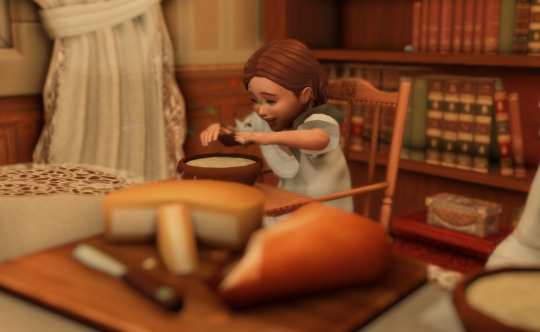
As the year 1838 neared its conclusion, the Langley farm stood as a bastion of agricultural prosperity. The approaching harvest season infused the air with a palpable sense of anticipation, promising a bounty of crops that would sustain the family through the coming winter months.
In the heart of the rustic farmhouse, Wilhelmina embarked on her familiar morning routine, orchestrating a humble yet nourishing breakfast for her loved ones. Drawing upon the simple ingredients at hand, she expertly prepared a steaming pot of oatmeal porridge, complemented by generous slices of leftover cheese and hearty chunks of bread salvaged from the previous evening's supper. Though the fare may have been modest, Wilhelmina's culinary prowess lent it a comforting allure, a testament to her resourcefulness and dedication to her family's well-being.
As the fragrant aroma of porridge wafted through the kitchen, Wilhelmina's attention turned to her youngest charges; Rosemary and the twins, Robert and Winifred. Despite her best efforts to entice them with the wholesome breakfast fare, the children's youthful exuberance prevailed, transforming the table into a playground of oats and crumbs.
"Rosemary, dear, food is meant to be eaten, not played with" Wilhelmina gently admonished, her voice carrying a note of maternal authority as she intervened to restore order to the breakfast table. With practiced ease, she wiped clean the sticky hands of her mischievous daughter before turning her gaze to Edwin.
Meanwhile, Edwin, typically accustomed to the rigors of farm life, found himself unexpectedly granted a day of reprieve from his labors. The prospect of leisure brought a rare smile to his weathered features, yet duty beckoned him beyond the confines of the farmstead. Later in the day, he would venture into the nearby village, tasked with procuring a flock of hens for the Abernathy family, an essential addition to their burgeoning homestead.
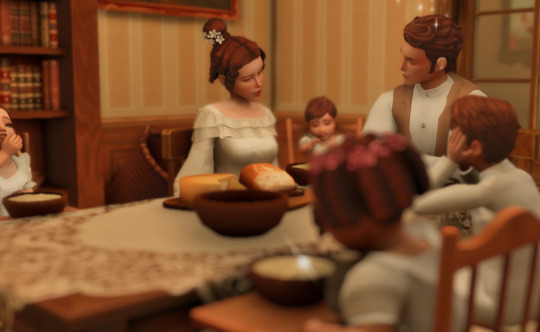
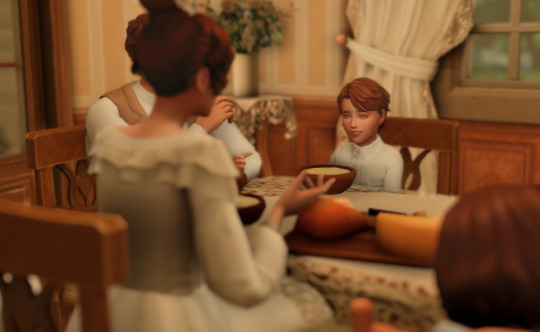
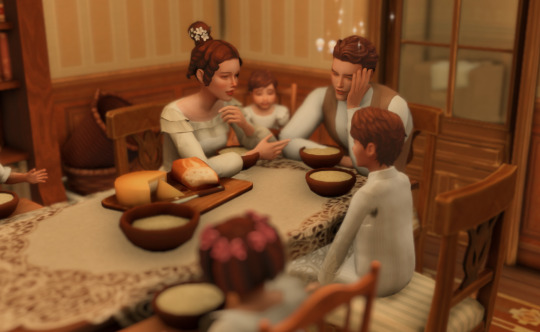
As Thomas rhythmically stirred his porridge, creating a soft clinking sound with the spoon against the bowl's rim, Wilhelmina's gaze subtly shifted towards her husband, Edwin, as she deftly prepared a slice of bread topped with a generous portion of cheese, noting the contemplative furrow of his brow.
With the bread placed neatly beside Edwin's bowl, she gently inquired, "What's on your mind?" as she deftly maneuvered a spoonful of porridge towards Robert's awaiting mouth.
Edwin paused momentarily, savoring a bite of the cheese-laden bread before responding, "Well, you know I've got to make a trip to town this afternoon to fetch some hens for the Abernathys, don't you?" Wilhelmina offered a nod in response, silently urging him to continue. "I've been mulling it over, thinking we might just consider getting a couple for ourselves, or maybe even three. I've crunched the numbers, and I reckon we've got enough to spare. It wouldn't hurt to find out the prices, at least."
Wilhelmina's expression softened, betraying the underlying concern for their financial stability, despite the recent prosperity of their farm. Memories of past hardships lingered, and the prospect of risking their newfound stability unsettled her.
Before Edwin could address her apprehension, Thomas, sensing the opportunity, chimed in, "Mum, think about it, no more need to buy eggs, and we'd have them fresh every morning."
"Indeed" Edwin interjected with a hint of enthusiasm. "Plus, it'd teach the little ones a thing or two about responsibility. Who knows, maybe down the line, we might consider expanding our little farm."
A faint smile tugged at the corners of Wilhelmina's lips as she entertained the idea. "Alright" she relented, albeit cautiously, "but let's agree to keep Rosemary and Winifred at a safe distance from the hens, shall we?"


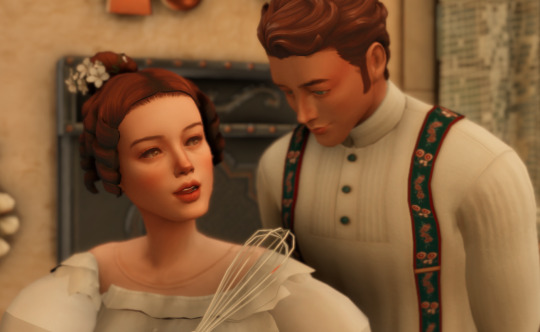
Shortly after Wilhelmina had meticulously scrubbed the remnants of the breakfast dishes, Josephine arrived, just as she did every morning. It had been several weeks since Josephine started spending her days with them, and Wilhelmina was growing increasingly fond of her presence.
As Josephine deftly tied her apron, signaling her readiness to assist Wilhelmina with the day's chores, she shared the news that Mary Elizabeth would be picking her up earlier than usual. It seemed her workday was ending prematurely due to the installation of new machinery at the factory, necessitating a clear workspace.
Wilhelmina paused, considering this new development, then suggested to Josephine that they seize the opportunity to prepare some desserts and tea for the afternoon. She reasoned that with Mary Elizabeth having a bit of extra free time, it could be a perfect chance to bond and alleviate her from the stresses of work.
They set about the task of making a sponge cake, with Josephine taking charge of mixing the ingredients. When Wilhelmina sampled the batter to assess its flavor, she couldn't suppress a slight grimace. Calling Edwin, who happened to be passing through the kitchen, she insisted he taste it as well.
"Is it truly that unpalatable?" Josephine inquired, feeling a twinge of embarrassment. Cooking wasn't exactly her forte; her mother hadn't had much opportunity to impart culinary skills, and her kitchen duties mainly revolved around dishwashing or fetching ingredients.
Edwin chuckled reassuringly. "Not to worry, you'll improve with practice" he assured her, offering a playful pat on the head before continuing on his way.
"Don't fret; we'll tweak the mixture. But do remind me to label the sugar and salt jars" Wilhelmina quipped, offering Josephine an encouraging smile. "Come along, dear, let's press on."

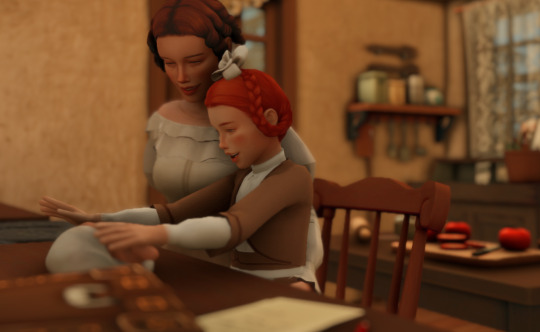
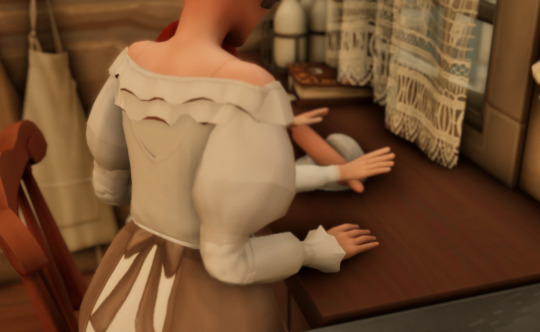

Before evening descended upon them, Edwin took charge of the tasks around the farm, ensuring that Thomas had time to enjoy himself with little Robert. As Edwin tended to watering the crops and pulling out weeds, which were nearly ripe for harvest, Rosemary and Winifred gleefully frolicked around him, their laughter echoing across the fields.
Meanwhile, in the cozy confines of the kitchen, Wilhelmina and Josephine busied themselves with various household chores, their ears attuned to the sounds of Edwin's interactions with the children drifting in from outside.
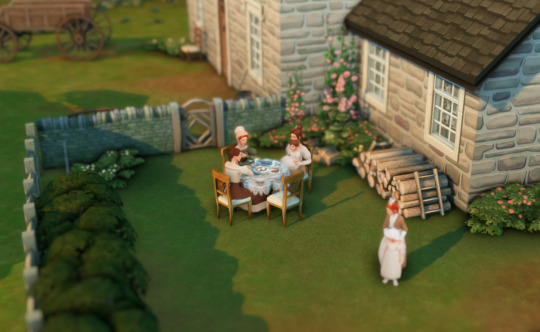

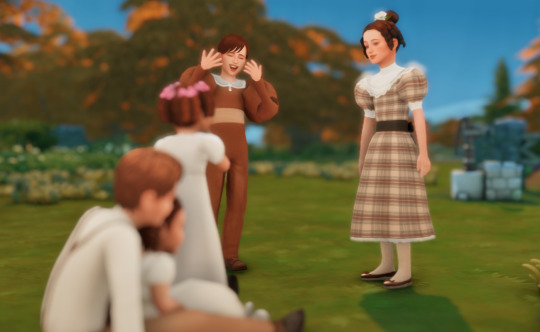
Before Mary Elizabeth arrived to collect her daughter, Wilhelmina made her way to the humble abode where the Ellis family resided. Arthur had been Edwin's lifelong friend, and recently Wilhelmina had struck up a friendship with his wife, Cora. She extended an invitation to Cora for a small tea gathering to chat and catch up.
The afternoon unfolded with ease. Upon Mary Elizabeth's arrival, she was pleasantly surprised by the impromptu gathering; she was truly in need of a break. The trio settled around the quaint outdoor table, and Wilhelmina served tea alongside slices of cake. Cora had brought along her children, Bernard and Beatrice, who were the same age as Thomas, and Vera, slightly older than Robert and Winifred.
Most of the children scattered to play near the farm, close to the edge of the nearby woods, while Josephine opted to remain close to the women, alongside Vera. If given the chance, Thomas would have preferred to stay by his mother's side rather than play, but he had to keep an eye on his sisters. Initially feeling a bit shy in the presence of Bernard and Beatrice, he soon discovered they were wonderful companions.
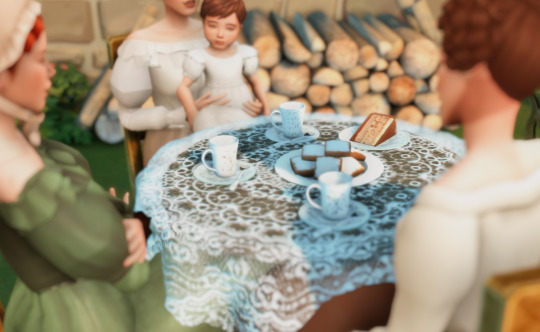



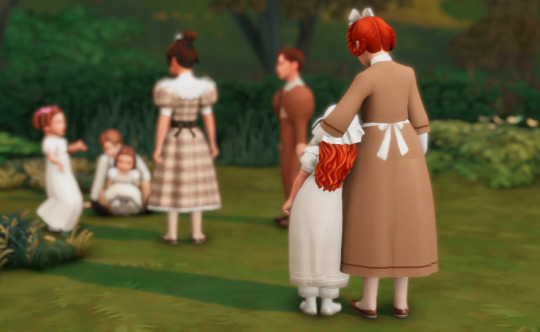
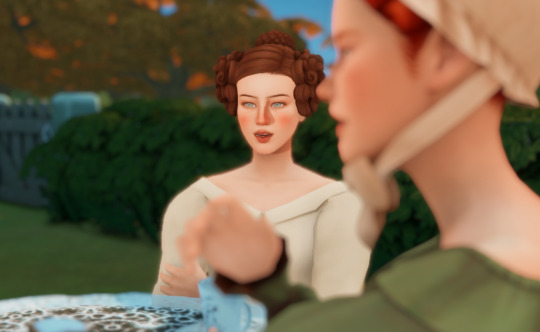

Wilhelmina found herself soothing Robert, who had returned to her seeking solace after a brief stint with the other children, clamoring for peace.
As the women gathered, their conversation ranged from household matters to their husbands' work, the daily grind with the children, and the latest whispers circulating through the village. Cora, however, introduced a new topic of interest.
"I've heard whispers that the church is considering building a school for the children" she mentioned between bites of cake.
Mary Elizabeth nodded in agreement. "I've overheard discussions at the factory about similar plans in other areas, but it's hard to say if there's any truth to it" she replied, her attention divided between the conversation and watching Josephine engage in a hand game with Vera.
Wilhelmina, with Robert fiddling with her fingers, pondered the notion. "Didn't they pass an education law some four years back? Perhaps it's finally coming to fruition" she mused, though her skepticism lingered regarding the government's interest in the education of the working class.
Taking a sip of her coffee, Cora shifted the conversation slightly. "By the way, I couldn't help but notice you've abandoned your mourning attire. Is there a reason?" she inquired, her tone delicately respectful.
Mary Elizabeth chuckled nervously, motioning for Josephine to join the other children. Josephine hesitated, feeling self-conscious, but understanding her mother's intention, she complied, joining Vera and the others in their play.
"Now, do tell us" Wilhelmina prompted, her curiosity piqued.
"I've met someone at work" Mary Elizabeth confessed, her fingers idly tracing the lace tablecloth. "We've begun courting, and I must admit, I'm rather taken with him…" Her voice trailed off as she played with the delicate fabric. "It didn't feel right to continue mourning for Alfred when my heart was beginning to open to someone new."
Touched by her friend's revelation, Wilhelmina placed a hand over her mouth, her eyes glistening with emotion. "I'm truly happy for you, my dear. You deserve to find happiness" she said warmly, while Cora beamed with excitement, sharing in the joy of Mary Elizabeth's newfound romance.
#ts4#sims 4#ts4 legacy#sims 4 legacy#ts4 historical#ts4 decades challenge#1830s#the langley legacy#wilhelmina langley#edwin langley#thomas langley#rosemary langley#robert langley#winifred langley#mary elizabeth aldridge#josephine aldridge
37 notes
·
View notes
Note
HYYYY!!! I appreciate your content...especially your latest post of Dagan Gera...I am such a fan of him...I wish they didn't kill him off so soon but...they're just trying to build something! Idk what...I post stuff of him as well if you want to follow...(or not)😊✌️
Dagan's character arc has grown on me a lot over the past few months. He's the last remnant of a forgotten history - in many ways his story has already happened by the time we meet him in Survivor. A powerful Jedi, filled with hope for a new world and new future, who feels betrayed by his community and ultimately by his closest friend. He is what Bode becomes, and what Cal could become.
But we only get Dagan for his final chapter, the beginning of his end. If anyone else but Cal had found him in that bacta tank, he would've easily reclaimed Tanalorr and gotten his home and his army: a misguided attempt to build that "bastion of order" that he and Santari dreamed of. But Tanalorr can't bring Santari back, and Dagan is left with a haunting "what-if" that drives him to his ultimate end.
I do wish we'd gotten more interactions that weren't just "Tanalorr is mine!" and I'm guessing his narrative was condensed to make sure Survivor's Act 3 had maximum impact. But I'll give Respawn credit for the finality of his story, and how his (corrupted) intentions for Tanalorr inspires Cal to offer it to the Hidden Path.
Fallen Order revolves around Cal exploring Zeffo ruins, learning about their civilization's rise and downfall. Survivor has Cal exploring High Republic ruins and learning about Dagan's rise and fall. He's the warning beacon that will likely echo into Jedi 3.
(Thanks for enjoying the photos! I don't post Dagan too often but he's a big piece of Traitor Inquisitorius Pt2, so keep an eye out for that :)
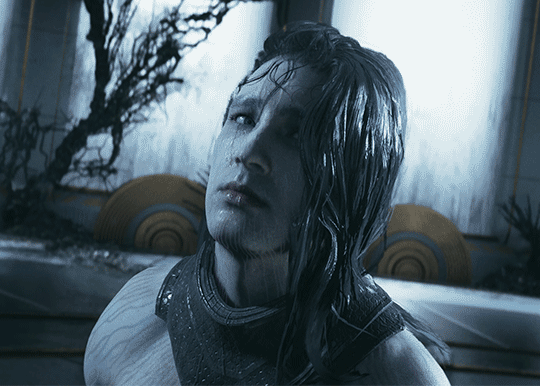
33 notes
·
View notes
Text
Ridtom OC Story Snippet #1
The Nightfolk
Summary: One hundred years ago, humanity broke the veil between Magic and Reality, ushering in a downpour of black rain and sickly-green skies as the Night Folk descended upon the land. Pockets of the original magical world exist as bastions of sanity in Warded Kingdoms, with the rest of the world trapped within the cold Night Tide. The young wizard prodigy Seraphina is given the ominous task of recruiting an infamous Night Tide shape-changer known only as Mulch to help solve a string of grisly murders within her home. But Mulch has left the Night Tide for a reason and secrets between the two magic users could spell their doom.
Excerpt:
If I had known ahead of time, I would have refused my master’s request.
“Oh wind of passage, let us down. Brush against us with your comforting embrace. Ruffle us no longer and let us be on our way.”
She felt her power flow through the wind, following her words, gently lowering the altitude they were flying at by several hundred feet. Wind - or Air depending on the Mage - was one of the trickier elements, and needed very specific words to guide the actions.
A sign of her ascendency to High Mage and tutelage under the Lord’s High Mage, she bore her elemental control with pride as the wind gently placed them along the ground, breezing past them with parting brushes.
In any other scenario, she would have preened at the chance for showing off her abilities.
Not the case when it came to Night Folk.
The mansion's road stretched before them, Seraphina leading the way through the dimly lit lawn. The orbs behind her head flickered with a soft glow, magic holding the elements within casting feeble rays on the worn cobblestones. Even the ball of flame behind her seemed unable to fully engulf the way in light.
Just as ominous as before.
That was to be expected of an area that bordered the edge of the Night Tide, where one could see the tide of shadow rain fall upwards to the heavens. Not near the manse located in the heart of Warderen, near the Lord’s Tower of all places.
It was as if they were spitting on the most holiest of land, in her opinion.
As they neared the crime scene, the air thickened with the unmistakable stench of decay. The guards she had posted there seemed sickly, though she had verified that there were no physical pollutants. It was the emotional remnants that lingered in the air and even she could not fully sway the effects from herself, despite the best efforts of Water and Air purity.
Before now, she had never known that emotional influence was a viable means of magic, though her master had told her it was not unheard of among some of the Lord’s High Mages of the past, and that Night Folk broke the rules in more ways than one.
Despite her best research and using various purifying techniques, she could not dim it’s presence absolutely.
Perhaps it was her unfortunate companion that was the cause.
Mulch - concealed in layers of dark robes and adorned with a grinning gold mask - moved about with an air of childish curiosity, keeping pace with Seraphina's longer strides despite her short stature.
Of course, Mulch had the ‘benefit’ of scuttling instead of walking, hints of countless pointed feet poking beneath her robes as she followed Seraphina. The sound it made on the cobblestone - like tiny bits of pebbles clicking and clacking - still brought shivers up her spine, no matter how long she was beside the tiny morph.
This was a mistake, she thought to herself. But she had no other options! She had stubbornly accepted this investigation for the Lord’s High Mage while he handled a travel treaty with a neighboring kingdom. It had been her idea to talk to Mulch, after having found a citizen complaint about a Night Folk living in a hovel near a market.
It had seemed to be the perfect storm of opportunities: study the Night Folk peasantry and use them to help her solve the case!
Too perfect. Mulch was… Mulch.
Seraphina couldn't shake the unease in her gut as she approached the mansion’s entrance, nor blame the guards for flinching and aiming their weapons in Mulch’s general direction as the two of them passed.
If Mulch cared to notice, her demeanor did not show it. She seemed far more fascinated with the mansion’s interior and the lavish cushions that had been torn to shreds in a fury of feathers.
Stopping at the scene, Seraphina raised her hand out in front of her, “Fires of Man. Brighten the day and sear the shadows. Illuminate the darkened deed.”
The orb of fire floated before her and she could feel as the power within her Abstractum fueled the element's commands. Light emanated even more from the orb, though without heat, pushing away the shadows of the darkened home.
The owner was there. In a sense at least.
Skeleton nailed to the wall with needles so fine that she could only see them from how the light glinted off of the metal. Meat and skin were spread out around the bones in a ring of glory, more needles holding them in place, blood no longer dripping like it had been hours ago.
She had cast ice of preservation to keep the scene intact, but the orb had lost power an hour ago, dissipating into the grand Abstractia.
His organs were still missing.
"This is where it happened," she said, her voice rough from the smell and emotional effect of the ritual. "He was last seen speaking to his niece about a business loan. She returned, drunk and angry, and found him like this. My colleagues preserved the scene and interrogated her for a time before clearing her of involvement. I’ve determined this to be some sort of ritual, the emotional aura is more than enough proof of that, but I have no idea why a merchant of all people.
Seraphina looked into Mulch’s golden mask, “I need your help to understand this murder. The only conclusion is that this is twisted magic from the Night Tide. Can you shed light on this, Mulch?"
Mulch looked at Seraphina for a moment before turning and scuttling closer to the body. Seraphina went to berate the morph for stepping onto the blood, only to pause as Mulch stopped at the edge. Mulch rose slowly into the air, exposing thin spikes of legs of greenish-yellow, almost like shells with finer spikes of hair along them.
Mulch rose higher than Seraphina was tall, leaning to inspect the body’s remnants. Mulch shook their head, "Mulch sees no death here. Not now, but then. Not Mulch's doing."
Ah, so you knew I likely suspected you, at least a tad.
Seraphina's gaze bore into the masked morph. "You have nothing else to offer? You're from the Night Tide, the source of those m- Night Folk. Do you truly have no familiarity with this ritual?"
Mulch let out a mewl, a sound that resonated beneath the grinning mask. "Mulch left the Night Tide. No more darkness. Seraphina is curious, like a moth around a flame. But is no flame. Is just pretty lights."
Seraphina clenched her jaw, orbs pulsating with restrained elemental power. Lord Above give me strength. "Facts, not riddles Mulch. If you have nothing to provide, then I will escort you back to your hovel. In the meantime-."
With a swift motion, Mulch extended a hidden limb from beneath the robes, morphing it into a shape reminiscent of a spider. The appendage moved with an otherworldly grace, chitin limbs flying out with surprising speed. Seraphina's orbs intensified in response, bathing Mulch's hidden appendage in their light, almost before Seraphina could react, several offensive commands on the tip of her tongue-
The spidery limbs, dozens of them, struck the glistening needles of the crime scene.
Retracting with that same eerie speed, all the needles were ripped from the body. With them came a tearing sound, like a wet towel splitting in twain, and then the gore was gone. Everything was gone; the blood, the bones, the meat and skin… nothing was left of the corpse.
The emotional disgust and smell of death vanished in an instant, leaving Seraphina gasping in sudden unexpected relief. The needles held within the spidery limbs were still glistening, but they held what looked like damp moss from stones.
"Mulch shapes as the Night Folk shapes,” Mulch explained plainly, retracting her limbs into the cloak, alongside the needles and moss. “Spiders, scorpions, swimming critters. But Mulch keeps the true form hidden."
Mulch pointed at the true scene in front of them, “Pretty lights. Not flame. Big sneak for Sun Folk and…”
And there were words on the wall where the corpse had been, ones that made Mulch pause.
YOU WANT THE MERCHANT
WE WANT THE MULCH
DELIVER ITS CORPSE TO THE NIGHT TIDE IN ONE DAY
Seraphina's eyes widened at the message. She towered over Mulch as the creature lowered itself down, but the masked enigma didn’t notice her approach.
"Mulch," she said quietly. “Why did you leave the Night Tide? Why do these kidnappers want you dead?"
I didn't even know Night Folk could die.
The gold mask stared at the message, inscrutable. "Mulch left for Seraphina.”
Seraphina blinked.
“Left for Sun Folk. Left for a taste of daylight. Left for curiosity, like a child peeking through keyholes."
Mulch turned their golden mask to face Seraphina, her voice quieter, “Mulch lied. Mulch left because Mulch was scared.”
19 notes
·
View notes
Note
My friends and I have been discussing how poorly designed/balanced the Warden is in MC and not only have we come up with several different ways to fix it but we've also concluded that Mojang is just utterly shit at balancing their game. Look at end city loot compared to other structures that are even harder to conquer, or how pigs are almost completely irrelevant for farming if you have any other passive mob, or the fact that invisibility potions are completely worthless because they don't work at ALL. I found that last one out the hard way and lost half a month's worth of gear from Mojang's incompetence. They seriously need to get their shit together.
I think loot from structures in Minecraft is somewhat intentionally under-powered, because the game is about building and exploring and farming and the lion's share of your resources are meant to come from your own gathering and farming activities. However you're definitely right.
For example, bastion remnants have really good loot and are relatively common; I've gone on trips into the Nether where I found and cleared more than one in the course of a single trip.
Meanwhile, woodland mansions are vanishingly rare and the valuable rooms may not generate at all. You could have to travel tens of thousands of blocks to get nothing but a bunch of wool and books.
Jungle pyramids are the ones I hate the most, they never have anything worth it in the chests.
But...ancient cities. I love the atmosphere and gameplay experience of the ancient cities, but they really unbalance the game in a lot of ways.
They have more and better loot than basically any other structure in the game, they can be cleared with nothing but skill, no armor or weapons of note needed. I think they USUALLY are a rare find, but this is the trouble with the procedurally-generated nature of the game; I've found multiple seeds with ancient cities directly under spawn, and multiple seeds with two ancient cities within ~250 blocks of spawn.
I think the mechanics and everything of the Warden are very well thought out and I deeply, deeply appreciate how you don't really have to risk the Warden if you are slow and cautious enough.
I complained lots about the Warden, but in hindsight the complaints had more to do with the Warden being prioritized at the expense of everything else and less to do with the Warden itself. We have to admit that the Warden is much better than lots of other hostile mobs in the game. Ghasts have too-small, janky hitboxes and can shoot you with fireballs from OUTSIDE RENDER DISTANCE. The Warden is a huge improvement in that you can prevent summoning him by being careful.
Also, recent updates have been fixing some of the most egregious issues with balancing. Before Caves and Cliffs, clay generated exclusively as small patches on the bottom of lakes and rivers and until the Wild Update it was not renewable. You had to intensively farm vines to get mossy cobblestone. I've only been playing since just after Village and Pillage and I Remember
Metal ores have only been affected by Fortune since 1.17!!!! Before that you had to mine stacks and stacks of ore blocks! Before axolotls were added, tropical fish existed and were completely useless!! Minecraft olds can tell you more.
230 notes
·
View notes
Text
The Four Eras of Minecraft History
First official post for this project!
So, I've divided up minecraft history into 4 eras, based on the decay of various structures and the loot that you can get from them. I've tentatively given each era a name, but they are absolutely not set in stone and subject to change.
So, the 4 eras. I'm just giving some brief summaries of each one, this project will eventually deep dive into each era
1. The Early Era
This era spans from the beginnings of the universe to the creation of the first nether portal. The structures that remain from this era are the trail ruins and the ocean ruins in the overworld, and the bastion remnant in the nether.
2. The Overworld-Nether Era
This era goes from the the creation of the first nether portal to the creation(/discovery?)* of the first end portal. Structures from this Era include the ruined portal, the ancient cities, nether fortresses, and strongholds.
*I'm not sure yet if the end portals were found or made, but I can make a whole different post about that.
3. The Tri-Dimensional Era
This era is likely spanning the largest amount of time, and doesn't have the clearest end or transition to the next era. The reason why will become clear in the next era. The structures from this era include, but are not limited to, desert temples, shipwrecks & buried treasure, mineshafts, and jungle temples in the overworld, and end cities in the end.
4. The Player Era
This era begins when a player first joins the world, which explains the unclear ending to the Tri-Dimensional Era. The structures in this era include those that are still actively occupied, whether it be by villagers, illagers, or witches. Therefore, the structures include villages, woodland mansions, pillager outposts, igloos and swamp huts.
5 notes
·
View notes
Note
Shadows of Spring then. OR anything Lux I don't know yet 😂❤️ (LUUUUUUX)
LOL, you hit an Erland story actually. ;) So i honestly went looking for a Lux piece you do not know. Which is not easy, because you know most of them. I take one where I am fairly sure, you didn't see it, or only the opening paragraphs. It is one of my crazier ones, so forgive me for that one. It was this one, or the time-travel one.
Chapter 1 – Enfant perdu
The hooting of a grey owl drew Lux out of his slumber, and the rolling hoot, almost like laughter rang through the early spring night air. He blinked against the pale moonlight filtering through the tall window illuminating the room.
Tall Window? His mind startled from the haze of sleep. His quarters in the bastion of storms had the privilege of a window - a small slit in the vaulted wall letting some vague light filter through. It was a privilege that only officers had, and Lux as a captain only made the cut because he was Captain of the Royal Impera. Everyone else had quarters deep in the underground vaults of the bastion. He blinked again. Definitely his quarters - his armour on the rack, the three glass holders for prayer candles, the clear glass discoloured from flame and ash, remnants of his past, and the shelf on the wall, stacked with books, this was his room - it did not change the straight walls and the high double lancet window with the complex tracery in the upper arches. The type of window was found in parts of the old palace wings, certainly not in the barracks. He pushed himself up on one arm, ready to swing his legs out of the bed, when he noticed, that he was not alone, someone’s arm was draped over his side, and his legs were partially entangled with someone else's.
He almost jumped up but forced himself to go still. If this was a dream, then a very real one, and if it was real… it couldn’t be. He had returned to his quarters in the bastion a few hours ago, after an angry and scathing dressing down from his Majesty, who had been deeply annoyed about the safety measures for the journey to Rowan. He had wished Lux to the other end of time and gotten truly vexed when Lux had dug in, he did not compromise where his Emperor’s safety was concerned, even if it meant risking the man’s ire. He still might see punishment for insolence - not the first in his career either. He carefully extricated his legs from the tangle, careful to not wake the person who was with him and then turned around. His hand brushed over the blanket. He frowned. His quarters were comfortable, but he most certainly used no sheets like these… what was going on here? Had he been drunk and landed in a guest suite? No, his things were here.
He sat up, and looked at the person lying between him and the wall, and he had to hastily balance himself to not fall out of the bed inelegantly. For tightly snuck in between him and the wall, buried in two comfortable blankets was the familiar figure of a very asleep and also very naked Emhyr var Emreis, resting peacefully on the thick bedroll Lux preferred in lieu of cushions.
Lux froze in place. This had to be a dream - a very vivid dream for sure. But a dream. Maybe brought on by the recent trouble? Had he been exhausted enough to allow his mind to slip to thoughts otherwise forbidden? Panic rose inside him, or had he been drugged with something? A magic delusion? Truth drug his mind supplied. They gave you the test of loyalty again after you were too recalcitrant. He sighed. He had been through that test by the court mages a number of times, they had trouble reading him correctly and thus had resolved to test his loyalty to the Emperor using a concoction of powerful drugs. The problem was - the drugs worked on one’s feelings towards the subject. He had passed those tests always with flying colours, but they buried at things that should better not come up to the surface.
He sighed, time to get out of here. He carefully moved off the bed, moving across the room noiselessly. The room was too big to be his quarters, even as it contained his familiar things. The floor felt cool under his naked feet, and there was a soft brush of air from the window, pebbling against his skin. He stepped to the small table holding the candles, lifting one up to smell it - prayer candles were usually scented. But instead of the familiar scent of sandalwood, the soft scent of blue lotus and moon orchids tickled his nose. He closed his eyes letting the gentle scent brush against his senses. The mages had really messed it up, or the mage administering the test had expensive tastes. Moon orchid candles were pricey on the best of days, not to mention that most makers reserved their moon orchid oils for making more marketable things than prayer candles.
He checked over his shoulder, the Emperor was still asleep, nothing was moving. Definitely a test. The mages could not fully see what happened inside the test, or they would have known about Lux years ago, but sometimes they tried to force it. He picked up the long pine chip, lit it at the dying fire in the open grate - since when did a Captain’s quarters warrant a fireplace of one’s own? - and when a small flame licked up the chip he ignited the prayer candle, a small flame rising.
While the light of the sun is beyond doubt or debate, the flame of a single candle is of greater danger, as every power needs a proper focus. The words long taught to him whispered in his mind. He put the pine chip aside after extinguishing it and took a deep breath to centre himself. Exciting this test was usually a matter of control of one’s own mind. He placed both hands in fists crossed on his chest, and directed his mind inward… to his core…
“Nightmare?” A warm voice asked from behind.
The Emperor had woken. Lux turned around, suddenly aware that he was in a state of full undress, and very well visible in the moonlight. Not to mention the candle casting a cone of light right on him.
Emhyr had propped himself up on one arm, warm brown eyes shimmering, reflecting the light of the candle. “Kaer Sion again?” he asked softly.
Lux almost took a step backwards, he could feel the colour drain from his face. How in the world did the Emperor know about this? No one - no one - knew what had happened in those dark days in that mountain fortress. He had managed to escape, and he had never told anyone of what had transpired there.
His mien must have confirmed it, for Emhyr extended a hand towards him. “Come back to bed, there are better remedies for nightmares, than prayers,”
Sun above, what kind of drug cocktails had the mages given him? Hesitantly Lux stepped back and touched Emhyr’s fingers, feeling them curl around his hand. “It was just a dream,” he said, trying to sound normal.
Emhyr pulled him down, so he came to sit on the bed again. “I know those ‘just a dreams’ too well,” he said, pulling Lux down onto the bed and feathering soft kisses along Lux’s jaw. “The kind of dreams, that has you pray warrants distraction,” he interspaced the words with more kisses, his lips trailing over Lux’s throat, and Lux threw back his head, to allow for that wonderfully warm touch. A part of him was panicking, if the mages saw that he’d be in for it. Their cocktail must be off by a lot this time.
“Sometimes a little focus helps,” he replied, biting away a Sire at the last moment. If this was just his own mind, he might as well behave normally. His fingers found Emhyr’s dark hair, slowly running through the silky locks. Lux couldn’t help it, the sudden closeness was intoxicating much as it was forbidden.
Emhyr interrupted his ministrations and looked up. “I prefer you without that focus, without the walls you build up, the man you hide beneath,” he said his hands gently but very insistently roaming Lux’s naked body.
The entire surreality of this hit Lux full force again. He was in bed with the Emperor, not that he would mind, but it was not likely to ever happen. And yet his mind and whatever drugs the mages had given him, had conjured this up and he did not manage to break the dream’s hold. He might as well…
“Walls protect, Emhyr,” he said, throwing all nerves to the wind, wrapping both arms around the other man, to kiss him in return. His hands wandered up Emhyr’s back, to the shoulder blades and he could feel the slender body strain into his touch.
Emhyr groaned, his hands running over the entire length of Lux’s body possessively. “Just a reason to crumble those walls again,” he said, before capturing Lux’s lips in a very deep kiss.
Lux’s closed his eyes, just letting the sensations wash over him, it was like a dream - a very forbidden dream - but his will to resist the dream’s lure was waning rapidly. He responded to Emhyr’s kiss slowly, not that it seemed to perturb him and let his hands slowly discover the lean body above him. When their kiss broke, Emhyr smiled at him, a hungry, brilliant smile. “Never let it be said, I could resist a wall in need of breaking down…”
***
When Lux woke again, he honestly expected to find himself tied to a testing chair in the bowels of the dungeons, with a good chance to throw up the rest of the potion. Instead, he found himself in bed, warmly snuggled up with a certain Emperor, and the first light filtered through the high window. Warm lips traced his scalp, Emhyr was already awake. Lux blinked up at him and was greeted with a smile, he could barely imagine Emhyr was capable of. “You slept like a marmot,” he said his eyes sparkling.
There was a closeness and intimacy in the words that seared itself directly into Lux’s heart. Even if his Emperor, like others before him, chose to sate his baser urges with one of his soldiers, physical affection would have been the most Lux might have hoped for. This… this was different. He tilted his head to feather a kiss on Emhyr’s lips. “You were right, the best remedy for restless dreams.”
He had hit it right, his Emhyr, this Emhyr they both liked to win and to be right because the slight smirk said told you so without words. Lux cast a glance at the window, registering the sunlight and sat up. “I better get moving or the General is going to have kittens…”
Emhyr chuckled. “One day, Lux, one day you will tell me what happened in that hole in the ground that convinced you Aeron is capable of that feature.”
“One day,” Lux echoed, he had no clue how such mornings were supposed to go, the usual cases gracing the Emperor’s bed were escorted out by morning at the latest if they had lasted all night. An Emperor in the quarters of one of his officers… there was no protocol in the world to rule that.
Emhyr misread his glance. “I know - it is this day - having to listen to Voorhis sniffling widow for hours will not be good. But it must be handled before we depart for Rowan.” He cast a glance at him. “Keep the helmet off today, my hunter, I want her to remember who gutted that treacherous curr for all the capital to see.”
He had killed Prince Voorhis? Publicly? Lux did not doubt he’d be capable of it, he had learned to kill and not ask questions when he had gone to the hills and joined those fighting the usurper, but… this sounded like a spectacle. He could not ask. “I best get myself scrubbed,” he said, having slipped into breeches and a light tunic. He’d have to find out where in the palace he was first, and then work out the rest.
His luck persisted, because his quarters were obviously situated near the hidden stairwell leading down into the bastion, and he could easily get to the communal baths from there. It was early enough for the baths to be not overcrowded and give him time to wash thoroughly. He was almost done when Bran, his Lieutenant, occupied the tub beside him and made a face. “Curd soap, Lux? Do you want to bring a bad mood down on all of us, one day before we ride - one day before he too has to be in the saddle all day? Don’t be cruel, please?”
Lux looked at his old friend, wondering what he was thinking. Were they friends? Or did he despise him for sleeping with the Emperor? What were they here? “Bran?” He asked, not quite sure what he meant. Everyone used curd soap down here, it was provided by the army in large quantities to keep the soldiers clean. Scented soaps were forbidden in military bathing houses - if everyone used them the stench would be enormous and every blind assassin would find them by the nose alone.
To his surprise Bran got out of the water, padded across the tiled floor and grabbed something from a basket and threw it at Lux, it was a bar of soap smelling of Winneburg orange blossoms and a small flask of oil from the same source. “You alright?” He asked with a hint of worry in his voice. “You know how he hates the ‘soldier stench’, so what made you revert to…”
“Just not thinking,” Lux replied, realising he’d have to play it by ear. “I was tired and went by…” habit he wanted to say, but he saw Bran’s arched eyebrow.
“Take a boy out of the hills, but you’ll never get the hills out of the boy,” Bran teased, before falling serious and letting himself drop into the water again. “Do us all the favour and avoid needless upheavals will you?” he said, “The whole Voorhis case will have him in a mood up and down the walls and the ride for Rowan…”
“So no carriage?” Lux asked, before diving under to clean his hair. When he came up Bran arched an eyebrow.
“Lux, please - there is no need to revert to that facade again. I have known since… well since ever I should think. I know he will travel horseback, much as he dislikes it, and use the chance to hit the communities along the road with surprise visitations. So keeping his mood somewhere bearable will be your prime mission objective from here on out. I guess the General isn’t saying it any more, because he can assume you know.”
Lux got out of the water, drying himself off, and swiftly got dressed again. He made a bit more haste, so he’d be at the guardroom before Bran, which gave him a chance to hastily flip through the guard log and get up to speed on the daily operations of the Royal Impera. He noticed it was run as a double company, each led by a Lieutenant, and the shift patterns were odd. So he’d have to find out the reason for it. Caio de Varderaan, the golden Peregrine, was another surprise. He led the secondary company, coming off the night shift, and he, like Bran, seemed to be an old comrade of Lux. “Word has it, that the Emperor intents to visit the extended var Emreis lines, once he has dealt with that Roweni Duke in Dun Fionn,” he said, “now that we are back here, he intents to crush all the traitors, much like he crushed the north….” he stopped and his eyes fell to Lux’s belt. “Gods above, why did you dig that blade out? Where’s your gear?”
Lux frowned, he wore a regular Impera belt with a familiar blade by his side, it was the same sword he used at home. A simple appearing blade, that had never failed him in many years. Before he could react, Caio had turned around. “Sergeant! Hailey - run over to the armourer and ask why the Captain’s gear isn’t back here. And make him work faster if he forgot it.”
Lux leaned against the windowsill covering his surprise. There had been no other weapon’s belt on the armour rack in his quarters. He was sure of that. He had grabbed the gear he had seen there, it was the usual gear Impera Officers used. Hailey - how in the world had he ended up in Impera? - came running back. “Trouble, Sir,” he said “The armourer says the gear vanished, armor and weapons. He had it last night and now it is gone. He swears it was right there.”
“Could be a matter of theft,” Lux said, “run to the master-at-arms and ask, maybe one of the helpers dropped it off with him when delivering the repaired gear this morning. Otherwise, we’ll make do.”
“Why in the world would someone steal your armour?” Caio arched an eyebrow. “It couldn’t be sold anywhere, without getting the person in trouble and no one can use it obviously.”
“Assassin,” Lux replied, “get a man of the same stature, put him into the armour and you’ll walk through the gates before someone wonders.”
“Now I know again, why you got this post,” Bran quibbed, “you are paranoid. Someone pretending to be you, wouldn’t last long in here, and if he is anywhere close, no five minutes. And I mean it.”
Not very encouraging words, Lux thought, though he kept any thought carefully wiped off his mien. “Let’s go over the day until Hailey gets back,” he said, and the next half hour was spent on planning by letting them talk, and listening Lux managed to fill in a lot of blanks that would allow him to function, at least in his role for now.
Hailey came running back with two helpers. “Weapons master says only your battle gear is stored with him, I had him break that out, to give us time to find out what happened at the armourer’s.”
It was an idea that made sense, or at least some sense. Again Lux played along, just enough to not give himself away. “Warn the other guards that someone might try to pretend to be me - just in case an assassin gets smart. And have the armourer check the basement - if one of his helpers decided to reorganize his stocks again…”
The words elicited a groan from Bran. “Then we might find your armour in three years behind a pile of steel bars. I’ll have someone on it.”
Alone in the narrow side room, Lux took the time to change, and examine the armour brought up. It made sense to split field gear and palace gear, as Impera’s Armours for court duty tended to be just a tad more ornate. But this chaos felt ridiculous. He worked fast the layer of leather first, they fit perfectly, and then the armour pieces. At first sight, they were typical Impera - black armour, the left pauldron engraved with the winding silver band indicating his rank, but when he assembled them he realised they were anything but. Two intricate layers of chain and steel were perfectly moulded to his body, allowing for flexibility while providing maximum protection. Some changes were subtle, like the much finer structure of the armour gloves, to allow the hands more movement range.
Lux almost dropped the bracer he was holding, realising it was not a one-piece lower arm bracer, but layered from several leaf-shaped plates. It wasn’t possible. This armour only made sense if he had ever let anyone know of his training. Jarcai demanded that style of flexibility. And the entire point of his military career had been to not let anyone know where his training had come from. Jarcai was not meant for war, it was meant to master mind and body and transcend the boundaries of the flesh. And like many others, Lux had used it to fight back against the Usurper. Like often before, those who had done so, would join the armies pretending to be good, but normal fighters, dispelling any fears that a sect had the potential to raise an army that could wipe regular forces off the map. He weighed the bracer in his hand - he usually used the excuse that he was trained in sword dancing, which had Vattier search up and down the garden districts for the remnant of an ancient knightly order. His fingers traced over the black steel, perfectly shaped to fit his body, to fit his movements. He could not have told the secret? Could he have told the truth to the Emperor? Lux had luckily never been in that spot. The Emperor did not care where the lethal skills came from, as long as it was used in his service.
Again a cold question rose inside him. Was this a test? Were the mages digging for a secret? No, it was unlikely. Then what was happening to him? Was he dreaming? Or was this a dream of another life? Lux had read about such experiences, but he knew he had never shown any talent for dreaming, be it prophetic, or transcendental. Worse even - he had no time to consider all variables. He was seemingly trapped within another version of his life, and one where he must have made very different choices. He sighed and finished donning the armour. Once it was assembled it fit like a second skin. He put the helm on the armour rack and walked out. He could only see what the day would bring.
2 notes
·
View notes
Text
YDYD:O Screenshots!

Second to last session! A lot of prep for the end!
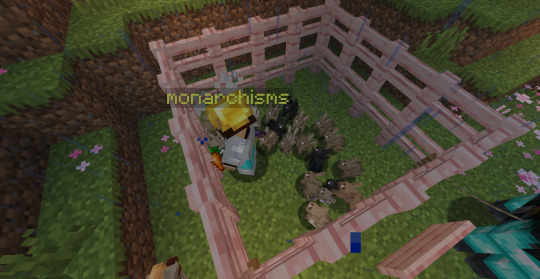
@monarchisms bnuy!
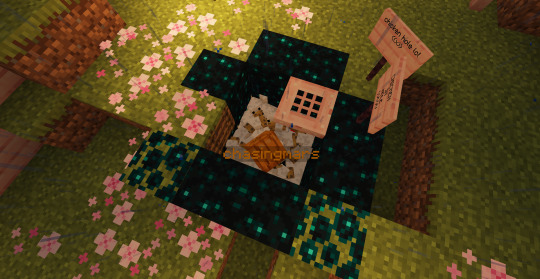
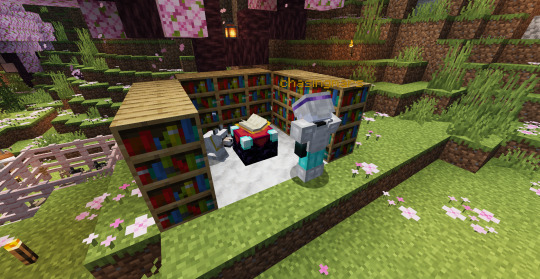
@transandor in the chole (chicken hole) and enchanting

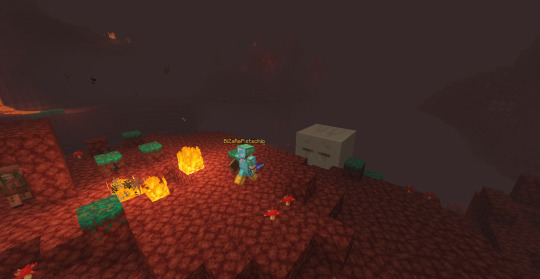
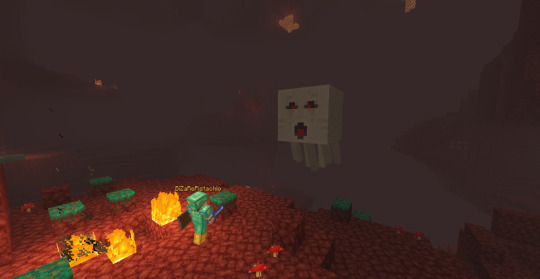
@bizarepistachio in the Nether fighting endermen and ghasts
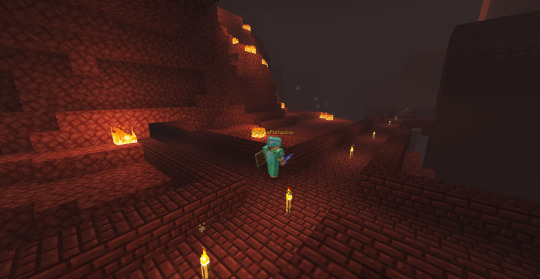
They also went to the fortress for the first time (scary!)
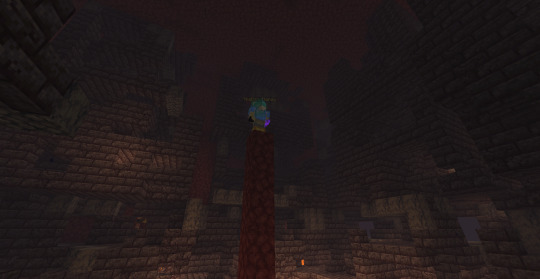
@thedeaddandy found a bastion remnant
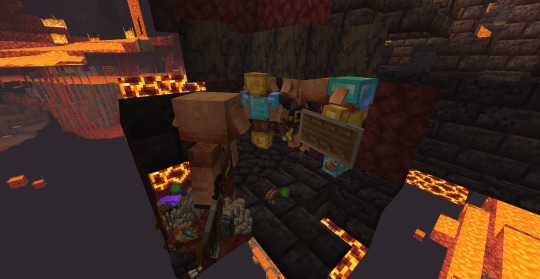
They did die to a piglin brute and the piglins put on their armor :O
They gained their life back later on by the target achievement
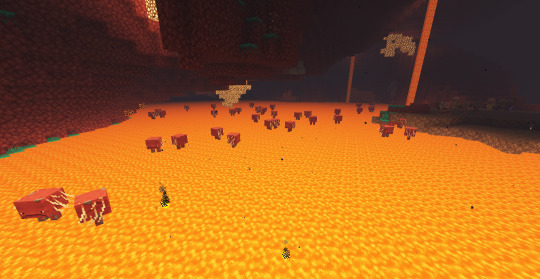
I found a group of about 39 striders
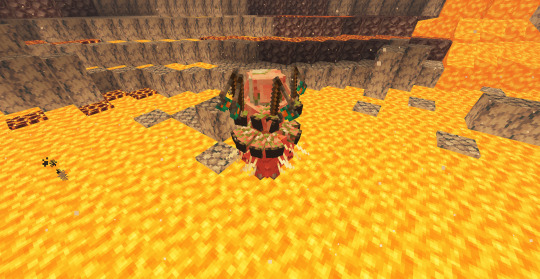
And four zombie pigmen holding 4 fishing rods with fungus on 4 striders all in one block
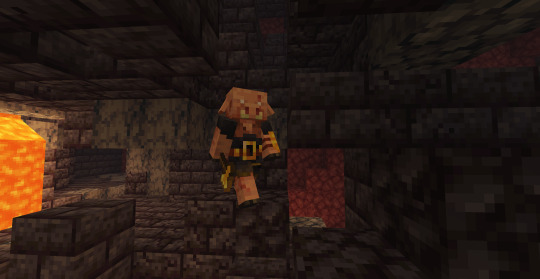
Piglin brute >:)
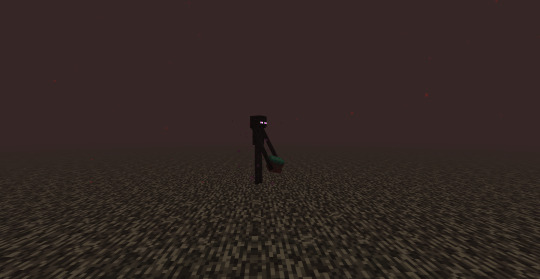
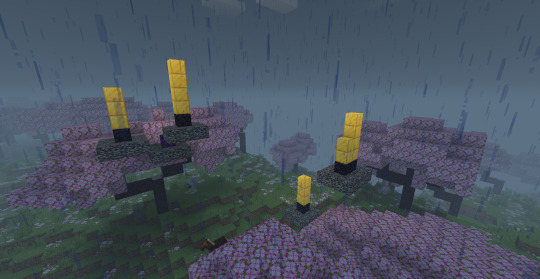
11 notes
·
View notes
Text
and the sad thing is i think. vol 9 had a chance to actually discuss death. i'm going to be extremely nice to RWBY and ignore my dislike for Jaune and how WBY has become and i will even ignore how awful everything and stupid around Penny's death is. i am going to be extraordinarily generous amd pretend that Penny's second death was written good and we should feel bad for Jaune for it
death is terrifying. Ruby and Jaune both have been completely traumatized and had years of their lives shaped by Pyrha's and Penny's deaths. Ruby got Penny back and now shes gone again. Jaune had to kill a friend. so they find a world where death is... not final.
i am going to say that yes, i view what thr Ever Afterians do is suicide. they commit suicide. they Paper Pleasers commited suicide. i dont think thats. inherently bad. thats how their world works, you fulfill a purpose, you die... you come back. its a fantasy world with a fantasy system about how death works, and the people of that world embrace it. they do not have thr philosophy of death that we of the real world or team RWBY have. death is not an end to them, and they dont have qualms about utilizing it for themselves when they wish to be reborn. its ok for them to have an alien attitude about death!
one thing i REALLY liked was when they were talking about the Paper Pleasers. team RWBY found it weird, but they accepted this world worked differently. Jaune was in the wrong because hes a teaumatized man with an understanding that to him, to Remnant, death is... final. he was trying to cope with his own trauma by forcing this outlook on a group people who would find OUR understanding and attitude about death and its finality as alien as we are to them.
and theres an appeal to it. its an appeal i could see both Ruby and Jaune, neither of whom are bastions of mental health thinking constantly about.
"Could I have a chance to be better, to do everything over?"
theyre tired. being depressed is tiring. anyone who has been depressed... knows that. its like being ao unendingly tired you dont ever remember what its like to not be tired. and when depression is so bad you think about ending it: from firsthand experience, i get the appeal of Ascension. the idea of waking up and i can be someone new, someone who isnt tired. i think that would appeal to Ruby and Jaune.
i think this should have been the entire theme of v9.
i think v9 should have been about death. it should have been about Ruby and Jaune's trauma regarding the deaths of those whonthey care about, about Atlas, everything reaching rock bottom. both of them barely coping and in a world where death... is different. but not for them.
Ruby should have held the teacup. she should have been contemplating suicide but ultimately didnt, because of things she came to a conclusion about death in this volume. Ruby Rose should have contemplated suicide in this world where death is different but not do so because she grew. they SAID the theme of this volume is "you are enough" but nothing happens to show it. she should not have attempted suicide like this: she should have contemplated it and decided not to do it with what she had learned and come ti understand.
RWBY Volume 9 should have been about Ruby and Jaune finally, TRULY coming to terms with the death of their precious friends and finally being able to fully move forward. This should have been one of the most emotionaply intense and heavy seasons. It should have been about death, its inevitibility, its finality, and above all making peace with it and the strength to persevere even when yearning for the end in the hopes of something better.
"You are enough."
17 notes
·
View notes
Text
Bracket E Round 1
Poll 16
Bad Idea Trio (@therainbowvaquero) vs. Devan Arkhiem (@winterpinetrees)
No readmore we die like men <3
287. Caleb Hirn & Cassius Netherson & Nemo Relity aka the Bad Idea Trio (@therainbowvaquero)
All three are he/him
Everyone needs a little guy to cheer on. Everyone needs a little blurbo to love. Everyone needs a little champion to watch life attack them vigorously. Everyone needs a little hero to watch suffer and struggle through the attacks. Everyone needs a little masterpiece to watch grow and overcome.
That is what the Bad Idea Trio is to me. Three people from different backgrounds, childhoods, and traumas that came together to survive and to learn how to love. Their world is based on the Origins mod for Minecraft, with Caleb being a human (later he discovers he’s a Witch), Nemo an Elytrian, and Cassius a Blazeborn.
Nemo is introduced in the story first. At the beginning of the story, he's found in a floating ship in a dimension called the End with no recollection of who he was or how he got there. He made his way with a friend to the Overworld. For the most part he was seen by everyone else as a blumbering idiot due to his daily memory loss and child-like nature. Despite this, he still kept doing his best to be helpful to everyone and prove himself as capable and intelligent.
Through old journals and meeting Caleb, he begins to collect pieces of his life and what he had done. He had been a hybrid hunter back when he looked human. He grew up in the guild with Caleb, but Nemo had deserted much earlier and helped a group of Enderians travel to the End where they were attacked by a dragon. During his fight with the dragon, Nemo had touched a magical artifact that unlocked his hybrid traits and grew his wings, though his mind suffered for it and he lost his ability to retain memories normally.
Despite not being able to stop the daily memory loss, he found ways to work with it. He had support from people and he met Cassius, who despite their rocky first encounters, eventually became his partner and later alterous husband (Nemo being greyaroace). Caleb found him after searching for Nemo for five years, and together they helped each other to survive and heal from the future traumas that awaited them. They became inseparable no matter what life (I the writer) threw at them.
Cassius started off as the embodiment of apathy and assery. He grew up alone in the Nether, claiming to have survived by his own strength and wits. Though the truth is up until he was a young teen, he was raised by a Piglin clan which he later betrayed and killed to gain free access to their bastion remnant and their riches.
Cassius’ story is one of learning how to be apathetic in a healthy way. He starts off caring only about himself, believing that other people are in charge of their own emotions and that it’s not his fault if they react negatively to him. He isn’t afraid to take up space, but he does fear other things. Namely connection. Because having connection to people makes you vulnerable in that area.
Cassius is a tank. He conquered different mobs as he grew up. His fatal flaw is he believes has to always be strong. He has to have power, he has to be able to hold his own. Alone. He can’t be weak, he can’t show vulnerability in any form.
But from the moment he pisses off one of the main characters, he has to begin to wrestle with how to get what he needs. If he pisses off certain people, he will loose the ability to function in society. He needs people as much as he hates it. But this journey doesn’t change him completely, and it shouldn’t. Whereas all the other main characters- including Caleb and Nemo- rub off on Cassius and teach him how to be compassionate and show his affection more openly, to recognize other’s reactions as an effect of what he does; Cassius also rubs off on everyone else.
Cassius is stubborn. Cassius is strong willed. Cassius doesn’t bow to forces stronger than him (he has fought gods for crying out loud). Cassius, despite learning that he has a hand in how people react to him, never lets go of his personal truth. That other people are responsible for themselves, for their own emotions. Because of that, when bullies come at him, when anyone tries to harm his chosen people, he doesn’t remorse over the consequences that befall them. Because their consequence is him.
Cassius teaches the people around him to be stronger, physically or emotionally. He teaches them to not put up with people who don’t value them or treat them with respect. Cassius fights for them when they feel like they don’t deserve it. He learns how to do what Caleb asked of him when they first met. “You’re a survivor. Help [the others] survive.”
Cassius is immovable by pressure, but easily led by gentleness. All this to say, Cassius is unashamed to be himself. He’s passion and fury wrapped up in one. He’s cockiness and intuition. He’s strength and vulnerability. Is he always a good person? Absolutely not. Is he always smart? Most of the time he’s an idiot. But he taught me how to love myself the way he loves the Bad Idea Trio. And I treasure him for it.
Caleb is the last to be introduced, but arguably the character that most drastically changes the whole world in the story. And it started with Nemo.
Caleb’s dream when he was a kid was to become a hunter, to rid the land of the dangerous hybrids and protect people. He joined at 14, and met a shy 12 year old Nemo. Nemo was often bullied by the older hunters, so Caleb befriended him and made it his mission to not let Nemo be left behind, to protect him. They had each other’s backs all up until Nemo began to withdraw from everyone.
One night, when Caleb was almost 18, Nemo asked him a hypothetical. “What if I was a hybrid? What would you do?” Caleb’s answer was, “We’d have to wait and see.” Not comforted with that answer, Nemo committed to carrying out his plan alone, blowing up the bases’ supplies and deserting to join the Enderians he had met. In the aftermath, Caleb found Nemo’s journal and discovered he was a low generation Elytrian with recessive genes that made him look completely human. And thus began the four year journey of wrestling as Caleb went off to college to study Hybridology and compete in hunting tournaments.
When Caleb graduated college, he put his hunting career to rest (although a lot less dramatically than Nemo) and began building a place called the Haven. An island for hybrids to come be safe from the hunters and scientists of the mainland, a place to live in peace. Caleb began stealthily raiding hunter bases, freeing captured hybrids and shepherding them to the Haven. All the while he searched for his long lost best friend, hoping Nemo wasn’t dead.
After five years, Caleb finally found him with Cassius and the rest of the cast, just in time to save them from hunters. Caleb brought them to the Haven, but Cassius and Nemo continued to follow him on his expeditions. Up until Caleb is captured by the hunters, presumed dead by the rest of the world. Nemo and Cassius mourn while in reality, Caleb is hidden in a secret base being brutally interrogated for the location of the Haven.
For three months, Caleb endures. During that time, 26 hybrids are killed in front of him in an effort to get him to talk. But he refuses to endanger the hundreds of lives on the island. Finally, his allies rescue him, but he comes back a shattered and guilt ridden man scared of endangering everyone around him. The work he’s done for the Haven has always been fueled by his need to make up for what he did as a hunter, but after being captured, he can’t hide his fears anymore.
Thus begins the years long healing process, relying on Nemo’s gentleness and Cassius’ strength to protect him and help him relearn trusting himself. He becomes a champion of the God of Music and Diplomacy, granting him the power to turn invisible, phase through almost anything, and control minds with his singing and guitar. He, Cassius, and Nemo get married and eventually have two sons, Achilles and Icarus, and an adopted daughter, Artemis. Caleb eventually steps up when war begins brewing, becoming the leader of a resistance of 600 volunteers against the Hunters’ Guild, training them and leading them into victory.
Caleb continues to struggle with PTSD for the rest of his life, manifesting itself in panic attacks and vivid nightmares. But he keeps fighting. He finds a purpose for himself once again. His whole journey is about learning to be at peace with his life, to be able to die proud of what he’s done.
Caleb is the character closest to my heart. He has many of my personal struggles, from questions about morals to trauma to carrying guilt. But he never truly gave up. In the times when I hopelessly questioned my purpose, he questioned and found an answer for both of us. “To do what’s right. For the sake of love. That’s the point.”
TLDR:
The Bad Idea Trio has taught me to love myself. They taught me loyalty. They taught me strength. They taught me vulnerability. They taught me trust. They taught me perseverance. They taught me purpose. I have been writing them for two years now, and I have watched them grow and their stories unfold. And I’m so proud of how far the silly little blurbos in my head have come.
“And the universe said I love you
And the universe said you played the game well
And the universe said everything you need is within you
And the universe said you are stronger than you know”
More reasons to love B.I.T.:


(art of the three of them together is a commission by ellipuukangas)
288. Devan Arkhiem (@winterpinetrees)
He/Him
Devan Arkhiem is a (elf, D&D inspired world) supervillain I made when I was far younger who I got so emotionally attached to that he stopped being a villain and the entire story shifted to make him a tragic hero of a revolution that betrayed its ideals.
As a teen, he was the face of a revolution, was betrayed, and nearly killed his ‘brother’. As an adult, he’s a sad wet cat of a man, the strongest wizard on earth, deeply traumatized, and trying to hold back an even greater evil. (the greater evil is inspired by lord Byron)
Here’s more details.
During his time as a teenage protagonist, he was a magical prodigy in an urban fantasy setting based on the early 2010s. He had two friends who were basically his brothers, one of whom was murdered, kicking off said revolution. The other, a fire mage named Markus who broke things first and asked questions later, joined Devan on his quest for revenge/elf rights. Devan became the hero of the revolution and fought a world war alongside a bunch of friends. Unfortunately, one of those friends was a literal devil inspired by Lord Byron. Byron took control of the revolution, and turned it into a global dictatorship. Devan felt he was too deep in the revolution to change his ways. Markus thought that evil needed to be stopped. They had a big fight and Devan won and was permanently traumatized. Hundreds of millions of other people died too. Whoops! War crimes!
Now, a full seventy years later, Devan Arkhiem is the president of a little piece of the empire that is less evil. He is married to a different friend from the revolution, and has two kids, one of whom wants to follow in Devan’s destructive/heroic footsteps. Devan hates this, but I mean, what can he do. He knows the horrors of war and will do anything to prevent another one. He will also do anything to protect the elven species, and his family. Unfortunately, the world is super messed up and another revolution is happening. So…he’s having a bad time. He survives the main story, but is executed for his war crimes afterwards.
If you think my blorbo is neat, I invite you to reach out. There is so much lore inside my brain.
Devan Arkhiem is a middle aged (looks 40ish) dark elf/drow, with long white hair and medium brown skin instead of purple. He has mirrored silver pupils, and three straight scars on the back of his left hand. Has a wedding ring on that hand too. Dresses like a pretty normal politician at this point in his life.
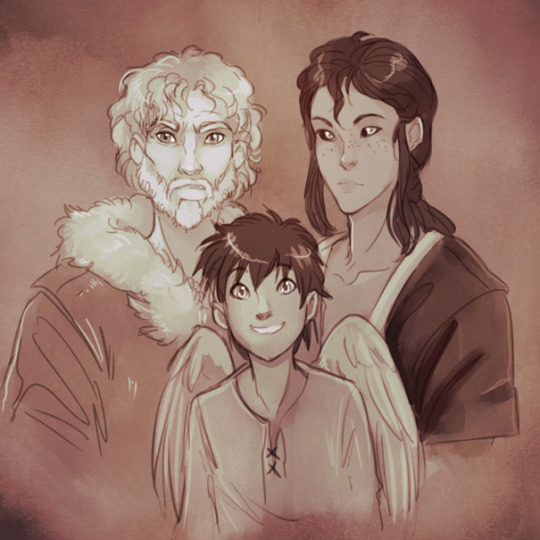
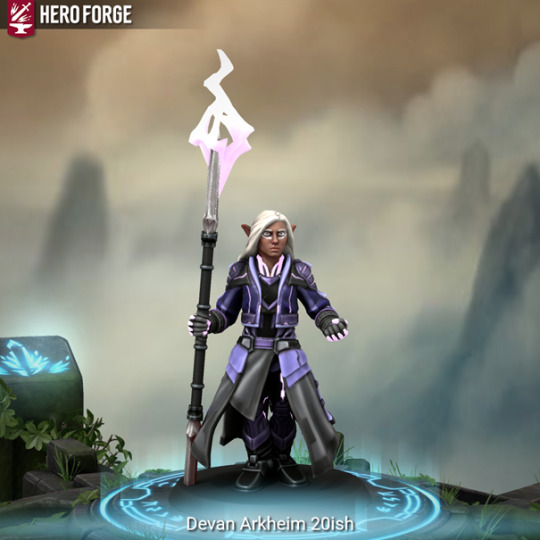
17 notes
·
View notes
Text
Whispering Inferno, Part 9
More superhero stuff in next post

In the stifling silence of the clinic, Kaida reluctantly surfaced from the depths of unconsciousness. Her eyelids, burdened by an invisible weight, resisted the pull to open fully. The sterile scent of antiseptic assaulted her senses, triggering an immediate surge of discomfort. The muted sounds of medical equipment and distant conversations intensified the disorientation.
She found herself muttering a disjointed mantra in a feeble attempt to deny her surroundings. "I'm not here... I don't wanna be here... why am I here," the words slipped from her lips like a fragile shield against the clinical reality pressing in. Initially unaware of her restrained state, a surge of instinctual panic compelled her to move. However, any attempt to escape was met with resistance, and the realization dawned upon her – she was bound. The unexpected restriction heightened her sense of vulnerability.
In a desperate bid to escape the perceived threat, Kaida's breath quickened, and her muscles tensed against the invisible bonds. The unfamiliar surroundings, coupled with the obscured familiarity of Zeke's masked presence, created a disconcerting atmosphere. Even in her hazy state, she was acutely aware of the visceral urge to break free.
As she struggled against the unseen restraints, the room itself seemed to warp, the antiseptic scent becoming more pronounced. Zeke, acknowledging her distress, moved closer in an attempt to provide comfort. "Kai, it's me – Zeke," he declared firmly, the removal of the mask revealing a face she recognized but didn't necessarily welcome. The lingering fear in her eyes reflected a deep-seated discomfort, a testament to a history that remained unresolved. In her hazy state, the lines between friend and foe blurred, and the assertive tone in Zeke's voice added to the confusion.
"You're safe here. No one is going to hurt you," Zeke's words cut through the fog, but the undertone of his assertiveness mingled with the remnants of anger she could sense. He extended a hand, a gesture meant to comfort, though it came across as an imposition in her eyes. Panic flashed across her features, and her hyperventilation intensified. Despite Zeke's attempts to reassure her, she recoiled, her wide-eyed gaze fixated on his face.
The dissonance in Kaida's mind intensified, torn between the desire for reassurance and the aversion that lingered from the past. Zeke, unyielding in his approach, maintained a commanding presence, insisting on a connection that she found difficult to embrace. "You're in my clinic, Kai. Mei brought you here. You're going to be okay," he assured her, the words falling on ears clouded by uncertainty. Despite his attempts to ground her in the present, Kaida's internal turmoil manifested in the form of a subdued resistance, a silent protest against the circumstances that had brought her back into Zeke's orbit.
In the struggle between consciousness and distress, Kaida succumbed to the overwhelming weight of her ordeal. The world tilted once more, and she succumbed to the welcoming darkness. Concern etched Zeke's face as he observed her fragile state.
Zeke's stern countenance betrayed an undercurrent of concern as Kaida stirred from her unconscious state earlier than anticipated. His watchful eyes, accustomed to assessing threats and calculating responses, now reflected a different kind of apprehension. Kaida's temperature, stubbornly resisting the efforts to bring it under control, weighed heavily on Zeke's mind.
The clinical atmosphere of the room, usually a bastion of certainty for him, now echoed with the uncertainty of her condition. Beneath the stoic facade, a conflict raged within Zeke. Anger simmered, directed not just at himself but also at Incendra and the tumultuous world that had driven them apart.
The mask of the Cimmerian concealed a deeper turmoil, a struggle against the distance that had grown between him and Kaida. Despite the dual nature of his existence, he couldn't escape the gnawing realization that, in protecting others, he had inadvertently distanced himself from someone important. The sterile room bore witness to Zeke's internal strife, a battle fought on the battleground of emotions, entwined with threads of regret, frustration, and an undeniable longing for connection.
3 notes
·
View notes
Text
Facts About The Aether
This is sort of my own spin on the Aether so that it’s not too similar to the mod. This will be updated if I need to.
- The Aether, like the Nether and the End, is its own unique realm. While the Nether is dangerous and hellish and the End is dark and empty, the Aether is peaceful and full of light.
- In it, you’ll find lots of open space, water, wispy clouds, many passive mobs, and the Aetherians, which are humanoids that have elytra wings fused to their back and beetle-like antennae. Their wings are different from the elytra wings you get in the End because they’re capable of sustained flight, and they can take off without the need for fireworks.
- The Nether is implied to be underground, and the End is implied to be in the void. Likewise, the Aether is implied to be high above the clouds. As such, most Aetherians have dark skin so that they won’t be sunburned. They’re also usually chubby or muscular so as to resist the atmospheric pressure.
- Just like the Nether, there are biomes unique to the Aether, such as the mixed forest, a place with trees that have different colored leaves in the same area, the upwellings, rocky streams with water so rapid that it can splash you from afar, and the floating islands biome, islands in the sky connected by vines and logs.
- I haven’t decided what the portal to (my version of) the Aether is made of, but I imagine it’s made of something that’s seemingly useless, like copper or amethyst.
- The passive mobs in the Aether are almost always winged.
- I imagine that in the Minecraft: Story Mode world, allays can only be found in the Aether. Allays bring Aetherians something in their hours of need if they give them something, or if they hear music playing.
- There are a lot more caves with drip leaves, spore blossoms and all that stuff.
- The Aether is led by a trio of rulers named Lucius, Uriel and Chandler. They each wear dazzling crowns and pure, silky white garments.
- They live in the Aether Palace, which is their equivalent of a Nether fortress or a bastion remnant.
- The leaders have six ladies-in-waiting: Skyla, Celeste, Rey, Marisol, Juniper and Aurora. Each of them can be seen dressed in a gown of a different color.
- They are served by many palace residents divided into “servant blocks.” Their clothes are decorated with little white dots resembling stars.
- Marisol discovered a functional portal frame while traveling outside the palace one day and ended up in Jesse’s world. She started collecting food items and sharing them with her friends. Now, she has a whole collection of flowers and other things. Every so often, she heads through that portal to add more to it.
- Sometimes, she and the other ladies change out of their gowns to go for a fly together.
- Not many people in the Aether are aware that Vega, who works as a servant, is plotting something sinister whenever she’s off-duty…
7 notes
·
View notes
Photo
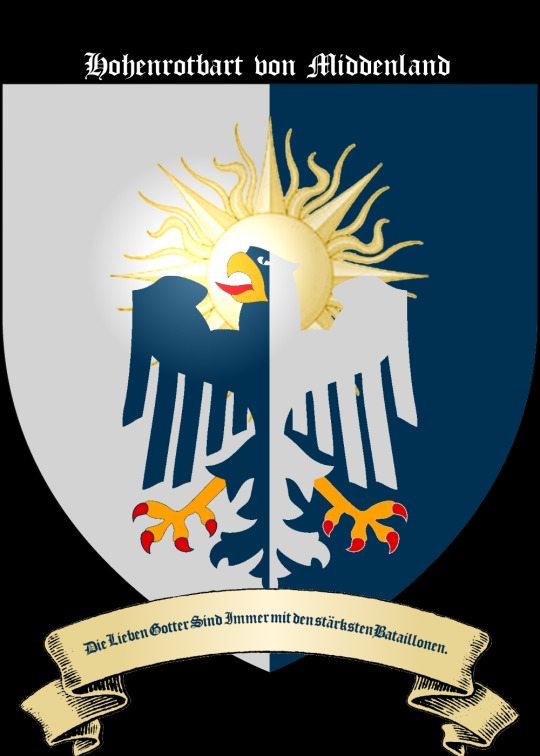



Some illustrations of pike-and-shotte infantry that I have officially designed for “Hohenrotbart,” the reigning, dynastic household of “Das Königreich Middenland” or “The Kingdom of Middenland” in my medieval fantasy setting. Both this series of illustrations, as well as their associated faction iconography, were officially designed for a low-fantasy setting of my original conception with technology and material culture equivalent to the late medieval and renaissance periods of European history. Where formations of heavily armoured and mounted, aristocratic knights in either suits of full plate armour or heavy coats of chainmail fight alongside professional armies of pikemen and matchlock musketeers. Where medieval-style stone castles are gradually being outsourced in favour of both lavish, sumptuous country estates and devoted military fortifications, or “bastions,” due to the technological advancements being made in gunpowder-based, siege artillery. And where fledgling nation-states, most notably in the form of kingdoms and empires, look beyond the great oceans and the frontiers of “The Known World” in search of even greater wealth and territory.
In context to the canon lore of my low-fantasy world, “Hohenrotbart” or “House Rotbart” is the newly crowned and anointed hereditary, dynastic household to “Das Königreich Middenland” or “The Kingdom of Middenland” following the stunning conclusion of “The Midlands Crusade” officially preached and prosecuted by Friedrich-Albrecht Von Rotbart as Bishop-Prince of Elchingen, one of the three ecclesiastical, invested “Kurfürsten des Selbst Kaiserreich der Menscheit” or “Prince-Electors of The Empire of Mankind Proper,” and Archpatriarchal Legate to Vexillarius IV for “The Midlands Crusade.” The apointed title of “Archpatriarchal Legate” essentially denoting the official, church-sanctioned representatives to the person of “The Reigning Bishop of Romulus” and “The Current Head of The Conservative Church of The New Gods” in either foreign affairs or in “errantry wars” and “crusades” officially preached and prosecuted against the enemies of The Conservative Faith. The historic, church-sanctioned consecration of The Basilica of Marienburg over the site of the former “Godswoods” marks both the official conclusion of The Midlands Crusade and the foundation of the new “Königreich Middenland” over the bulk of the remnants of “The Former Kingdom of The Midlands.” In terms of it’s historical, cultural, and religious sources of inspiration, “Das Königreich Middenland” under the hereditary, dynastic rule of “Hohenrotbart” as “Die Könige von Middenland” draws heavy influences from medieval and renaissance Prussia under “The Monastic State of The Teutonic Knights” or “Deutschordenstaat,” as well as Ducal Prussia during the 16th and 17th centuries.” With Friedrich I’s legislative decree to officially convert to Karl Von Luxembourg’s general, sweeping, and international reformation to The Conservative Church of The New Gods on behalf of both his dynastic house and his hereditary subjects being highly analogous to the secularization of “The Monastic State of The Teutonic Knights” or “Deutschordenstaat” to The Lutheran, East Prussian Duchy during the early 16th century.
Under the hereditary, dynastic rule of Friedrich I as “Der erster und herrschend König von Middenland” und “Der Gründungschef von Hohenrotbart” or “The Founding Head of House Rotbart,” as the kingdom’s first reigning, hereditary, monarch and dynastic household since the untimely extinction of legitimate, male bloodline of “The Late House Bartholemew” and the subsequent collapse of “The Former Kingdom of The Midlands” over a century and a half ago. “Das Königreich Middenland,” as it has been termed since the official, church-sanctioned consecration of The Basilica of Marienburg over the site of the former “Godswoods” at the conclusion of “The Midlands Crusade,” with the subsequent investiture of Friedrich-Albrecht Von Rotbart as the first “Bishop-Patriarch of Marienburg” has officially become the first culture and state in both the recorded history, and the enormity of “The Known World” to renounce The Conservative Faith of The New Gods based on the old, Classical Romulan rite and liturgy originally formalized and decreed under The Classical Romulan Imperator “Cassadorian the Great” in favour of “The Luxembourgian Reforms” as officially preached and published by Karl Von Luxembourg, a learned doctor of theology based at Die Universität Wörtzburch as well as the leading and titular “Great Reformer” to The Conservative Church of The New Gods, with Friedrich I’s legislative decree to officially convert to The Luxembourgian Reformation on behalf of both his dynastic house and his hereditary subjects.
Long before Friedrich I’s formal coronation and anointment as “Der erster und herrschend König von Middenland” und “Der Gründungschef von Hohenrotbart.” Friedrich Von Rotbart was originally a minor aristocrat and mercenary captain of a pike-and-shotte infantry company known as “Die Bande Des Falke” or “The Band of The Hawk” operating within both the “Austere” and the “Frivolous” cultural and linguistic hemispheres of The Empire of Mankind. With the advent of the official, church-sanctioned preaching and prosecution of “The Midlands Crusade” under his more prestigious, prolific, and illustrious older brother Friedrich-Albrecht Von Rotbart as Bishop-Prince of Elchingen, one of the three ecclesiastical, invested “Kurfürsten des Selbst Kaiserreich der Menscheit” or “Prince-Electors of The Empire of Mankind Proper,” and Archpatriarchal Legate to Vexillarius IV for “The Midlands Crusade.” Friedrich Von Rotbart and his “Die Bande Des Falke” flocked to the banner of The Midlands Crusade officially preached and prosecuted against the apostate, Albic tribes religiously subscribed to the druidic worship of “Erdøk,” a strange, nature-worshipping faith that long predated the rise of organized worship in both The Canon Pantheons of The Old and The New Gods and remained prevalent within the confines of “The Great Bastion” or “The Great Forest of Erdøk” situated directly east of The Empire of Mankind. “Erdøk” as a unique form of religious worship had begun to spread in prominence within The Former Kingdom of The Midlands long before the untimely extinction of the legitimate, male bloodline of The Late House Bartholemew and the subsequent collapse of The Former Kingdom of The Mildands over a century and a half ago. Although both Friedrich Von Rotbart and his Bande Des Falke only fought in The Midlands Crusade as minor belligerents, despite having allegedly fought and served with such distinction so as to earn both the respect and the commendation of their fellow crusaders and the church authorities officially involved in the crusade. Friedrich Von Rotbart through his sheer hereditary ties to The Archpatriarchal Legate to Vexillarius IV for The Midlands Crusade and The First Bishop-Patriarch of Marienburg was prioritized over all other prospective candidates for the coronation and the anointment as “Der erster und herrschend König von Middenland” und “Der Gründungschef von Hohenrotbart.”
In joint partnership with his older brother Friedrich-Albrecht Von Rotbart as the first Bishop-Patriarch of Marienburg over the rulership and administration of the new “Königreich Middenland.” Friedrich I, in conjunction with the clergy of The Conservative Church of The New Gods, facilitated the systematic, mass conversion of the autochthonous “Albic” tribes of The Former Kingdom of The Midlands back into the fold of The Conservative Faith under the formal leadership of “The Bishop of Romulus” or “The Archpatriarch” officially seated in The Holy Sept of the old, Classical Romulan capital and titular namesake of “The Empire of Mankind Primus” that had once dominated the overwhelming majority of “The Known World” during the long forgotten epoch of “Classical Antiquity.” Alongside the gradual, eventual conversion, and occasional pacification through force of arms and military might, of the indigenous “Albic” tribes of The Former Kingdom of The Midlands. “Das Königreich Middenland” throughout the long, prolific, and illustrious reign of Friedrich I as “Der erster und herrschend König von Middenland” und “Der Gründungschef von Hohenrotbart” has been thoroughly and effectively resettled by colonists and settlers hailing from Friedrich I’s native “Austere” or “Northern Imperial” cultural and linguistic hemisphere within The Empire of Mankind. Most notably into the newly established, fortified towns and cities founded either directly under the official, state administration of Der erster und herrschend König von Middenland, himself, or by the newly established baronial magnates of “Junker” aristocracy in direct homage to Hohenrotbart as “Die Könige von Middenland.” In addition to the thorough and effective resettlement of culturally and ethnically “Austere” or “Northern Imperial” colonists and settlers into the newly established, fortified towns and cities, as well as the most arable rural estates of their surrounding countryside. The autochthonous Albic tribes have been gradually assimilated into both the Northern Imperial culture and ethnicity through a combination of church-sponsored dowries in order to promote intermarriage between male colonists and settlers hailing from the “Austere” or “Northern Imperial” cultural and linguistic hemisphere of The Empire of Mankind with the Albic natives. As well as the proliferation of both the oral and written “Austere” or “Northern Imperial” language and culture through the religious services and church schools officially sponsored by the culturally and ethnically “Austere” or “Northern Imperial” Conservative clergy. Although having been gradually, albeit thoroughly, transformed into a culturally “Austere” or “Northern Imperial” nation-state situated uniquely without the southernmost frontiers and beyond the official jurisdiction of The Empire of Mankind.” Thanks in full to the long, prolific, and illustrious reign of Friedrich I in conjunction with the culturally and ethnically Northern Imperial Conservative clergy over the rulership, administration, and systematic, mass conversion of the Albic tribes indigenous to “Das Königreich Middenland.” Das Königreich Middenland, based uniquely without the established frontiers and beyond the official jurisdiction of The Empire of Mankind, alongside neighbouring “Markgrafschaft Brannenborg” as the newest, most recent, constituent member state of, and historic, territorial addition to the lands of The Empire of Mankind Proper, and one oddly and uniquely situated within the southernmost frontiers of The Empire, have come to collectively form a “Teutogen” or “Southern Austere” cultural and linguistic bloc within the confines of “The Civilized World Proper” that is uniquely characterized by both it’s shared cultural heritage as the crusader states born of the complimentary events of “The Southern Crusades” and the subsequent “Sudsiedlung,” as well as their common heritage as the earliest religious converts to The “Reformed” Faith of The New Gods based on the theological reforms of Karl Von Luxembourg with his scriptural emphasis on both the vernacular translation and the strict, universal interpretation of The Holy Canons of The New Gods by all social classes outside the clergy and the feudal aristocracy.
“Das Königreich Middenland,” with it’s complimentary policies of rampant, obsessive-compulsive military fortification, most notably in the form of stone castles and city walls, with the thorough, effective, state-mandated militarization of Das Königreich Middenland were both born of the equally stubborn and violent resistance put up by the indigenous Albic tribes, who had deeply resented both their systematic, mass conversion back into the fold of The Conservative Church of The New Gods as well as the systematic persecution and marginalization of their religious liberties that came synonymously with the “Austere” or “Northern Imperial” cultural and ethnic assimilation efforts that characterized both “Die Markgrafschaft Brannenborg” since the official, hereditary, and dynastic enfeoffment of the great Imperial general Friedrich Biermann as “Der erster und herrschend Markgraf der Sudetenmark” und “Der Gründungschef von Hohenbiermann” shortly after the illegitimate successor the the last Batholemew King of The Midlands originally pawned, and later permanently transferred hereditary control over the lands of the former “Sudetenmark” to The Imperial Household based in “Der Reichstadt” or “The Imperial Demesne.” As well as “Das Königreich Middenland” since the final conclusion of “The Midlands Crusade” with the church-sanctioned consecration of The Basilica of Marienburg by Bishop-Prince Friedrich-Albrecht Von Rotbart over the site of the former “Godswoods,” and the subsequent coronation and anointment of his younger brother Friedrich Von Rotbart as “Friedrich I, Der erster und herrschend König von Middenland” und “Der Gründungschef von Hohenrotbart.” Das Königreich Middenland, since the official coronation and anointment of Friedrich I as Der erster und herrschend König von Middenland und Der Gründungschef von Hohenrotbart, has been distinctly characterized by it’s complimentary policies of rampant, obsessive-compulsive military fortification, most notably in the form of medieval-style stone castles and city walls, and it’s thorough, effective, state-mandated militarization to such a degree, that it has already become the single, most prominent, military superpower within the church-prescribed confines of “The Known World,” and perhaps beyond. Despite it’s official status as the newest, constituent member amongst the established powers within The Civilized World. Das Königreich Middenland under the hereditary, dynastic rule of Friedrich I as it’s first and reigning king has come to possess one of the single largest, most skilled, most disciplined, and most professional fighting forces throughout the breadth and the enormity of The Known World. And one whose numeric size and professional level of quality and discipline are both highly disproportionate to it’s initial and base economic and industrial yield and value. Under the personal stewardship and the direct supervision of Friedrich I as a former captain of pike-and-shotte infantry before his expressed invitation and personal involvement in The Midlands Crusade at the behest of his older brother as Archpatriarchal Legate. The professional, pike-and-shotte infantry regiments in domestic, royal, military service to Hohenrotbart as “Die Könige von Middenland” have come to unquestionably represent the most skilled, disciplined, and professional pike-and-shotte infantry armies south of Margrabia Mazowsza.
Although born out of his inherent distrust for the baronial magnates of “Junker” nobility who had recently carved out lands, estates, titles for themselves as the bulk and core of the heavily armoured and mounted, aristocratic knights who had originally fought and participated in The Midlands Crusade. The same class of Junker nobles and aristocrats who had received reluctantly, and with icy anticipation, the formal coronation and anointment of Friedrich I as their liege lord and sovereign, due to his personal background as a minor aristocrat from the “Austere” or “Northern Imperial” cultural and linguistic hemisphere of The Empire of Mankind. As well as his professional background as a mercenary captain of pike-and-shotte infantry, as opposed to aristocratic heavy cavalry as the traditionally most prestigious form of military service due to the historical precedence of the feudal, aristocratic traditions of professional chivalry. The heavily armoured and mounted, aristocratic knights compelled into domestic, royal, military service to Hohenrotbart as “Die Könige von Middenland” likewise parallel the professional, pike-and-shotte infantry regiments hailing from Das Königreich Middenland in terms of their unique, pseudo-monastic culture of strict, military discipline, professionalism, and skill at arms. Organized into distinct orders of elite, secular, martial fraternities known as “Bruderschaften” or “Brotherhoods.” Each “Bruderschaft” was placed under the personal command and direct supervision of “Ein Großmeister,” or “A Grandmaster,” who were individually appointed for life from members of Das Königreich Middenland’s great houses of Junker nobility to serve the royal, state interests of Hohenrotbart as Die Könige von Middenland over the feudal, private interests of any single, great house of Junker aristocracy. “Die Shwartzen Rieterren” or “The Black Riders,” termed for the distinct and signature colour of their armour, were elite, heavily armoured cavalrymen drawn from the second sons of Junker nobles and aristocrats in order to tie the feudal, dynastic homage of Das Königreich Middenland’s greater and lesser houses of Junker aristocracy to the persons of Der König von Middenland and all his hereditary, dynastic successors. To further assure the loyalties of both “Die Schwartzen Rieterren” and their respective “Großmeister” individually charged with the military command and direct supervision of their respective “Bruderschaft.” “Die Bruderschaften” were made completely and fully dependent on a combination of the national, state budget generated by both regular taxation of Das Königreich Middenland’s crownlands and any tariffs officially levied and imposed on Der König von Middenland’s charter companies and the local trade guilds, as well as tithes generated by both the religious services of, and donations to The Conservative Church of The New Gods in joint partnership with Friedrich I over the rulership, administration, and systematic, mass conversion of the autochthonous Albic tribes of Das Königreich Middenland, in order to effectively finance both their livelihoods and their upkeep costs as the national, professional, state-funded heavy cavalry army in direct service to The Kings of Middenland. Both “Die Großmeister” and all “Die Shwartzen Rieterren” under their respective command and direct supervision were expected to legally forfeit any landed titles, estates, and incomes in their possession, regardless of the nature of their obligatory or voluntary enrollment into their respective “Brudershaft.” While “Die Großmeister” could be immediately and unceremoniously stripped of their command and office should they show any signs of insubordination to the persons of “Der König von Middenland” or any of his official, state-sanctioned representatives. This unique, pseudo-monastic, military culture of strict, military discipline, professionalism, and skill at arms has come both characterize and engender the heavily armoured and mounted, aristocratic knights serving Die Könige von Middenland as “Shwartzen Rieterren” as some of the most feared and respected professional heavy cavalry in The Known World. “Die Shwartzen Rieterren” as Der König von Middenland’s domestic, royal, professional heavy cavalry army have come to collectively earn both a reputation, as well as a significant degree of notoriety for themselves, as some of the few heavy cavalrymen throughout the breadth and enormity of The Known World to truly impress and unnerve, in equal measure, the heavily armoured and mounted, aristocratic knights hailing from neighbouring “Le Royaume d’Aquitaine.” Who pridefully, arrogantly, and vaingloriously boast themselves to be the single greatest, most skilled, most disciplined, and most professional heavy cavalrymen throughout the breadth and the enormity of The Known World, and perhaps beyond.
With the passing away of Bishop-Patriarch Friedrich-Albrecht Von Rotbart as The Archpatriarchal Legate to Vexillarius IV for The Midlands Crusade and the first, official Bishop-Patriarch of Marienburg. The elderly Archpatriarch Vexillarius IV as the 299th and reigning Bishop of Romulus and the current Head of The Conservative Church of The New Gods formally invested in Wolfgang Amadeus Von Holswig-Schlestien, Bishop-Prince of Griffenheim and one of the three ecclesiastical, invested “Kurfürsten des Selbst Kaiserreich der Menscheit” or “Prince-Electors of The Empire of Mankind Proper,” as Friedrich-Albrecht Von Rotbart’s official, church-sanctioned successor as the new Bishop-Patriarch of Marienburg. Both this new Bishop-Patriarch of Marienburg, as well as all of his clerical and lay followers, proved seemingly antithetical to both the secular, royal interests of Hohenrotbart as Die Könige von Middenland in particular, and the national, state interests of Das Königreich Middenland at large. Stating at one point that “The Midlands Crusade was officially preached and prosecuted in the name of The Canon Pantheon of The New Gods, not in the name of the selfish and conceited interests of prospective monarchs and aristocrats. And it was by their sheer grace that The Midlands Crusade had concluded, in overwhelming triumph, for the forces of The Conservative Church.” With this new Bishop-Patriarch of Marienburg hellbent on prioritizing The Conservative Church of The New Gods’ exclusive domination over the rulership, administration, and systematic, mass conversion of the indigenous Albic tribes of Das Königreich Middenland at the expense of marginalizing the secular, royal power and authority of Die Könige von Middenland to an almost purely nominal role. Friedrich I consequently passed state legislation as “Der erster und herrschend König von Middenland” und “Der Gründungschef von Hohenrotbart” to become the first hereditary, dynastic ruler in both the recorded history, and the enormity of “The Known World” to officially convert to The “Reformed” Faith of The New Gods based on the theological reforms of Karl Von Luxembourg, a learned doctor of theology based at Die Universität Wörtzburch in Das Herzogtum Solingen, one of the leading centres of church-sanctioned, academic research on both The Canon Theology of The New Gods and Cosmopolitan, Classical Romulan Civil Law and Jurisprudence throughout the breadth and the entirety of The Civilized World, on behalf of both his dynastic house and his hereditary subjects. With Friedrich I’s official conversion to “The Luxembourgian Reformation” on behalf of both Hohenrotbart and Das Königreich Middenland, Friedrich I had finally assumed supreme authority over matters of religion in his kingdom. Consequently making himself the effective and virtual “Supreme Head of The Reformed Church of The New Gods in Das Königreich Middenland.” From that point on, Friedrich I as “The Supreme Head of The Reformed Church of The New Gods in Middenland” was given full control over the state investiture of new bishops and abbots within Das Königreich Middenland, including exclusive investiture over the venerable and prestigious ecclesiastical office of “Bishop-Patriarch of Marienburg” since it’s official establishment by his late older brother Friedrich-Albrecht Von Rotbart at the final conclusion of The Midlands Crusade. Friedrich I, as the hereditary, dynastic monarch of the first major culture and state in both the recorded history and the enormity of The Known World to officially convert to “The Luxembourgian Reforms,” likewise encouraged both the spread and the growth of mass literacy in Das Königreich Middenland by proliferating the vernacular translations of The Holy Canons of The New Gods printed in the “Austere” or “Northern Imperial” language using printers, church schools, and missionaries sympathetic to Karl Von Luxembourg’s theological reforms. In addition to the proliferation of both the vernacular translations of The Holy Canons of The New Gods and other religious literature and pamphlets printed in the “Austere” or “Northern Imperial” language, Friedrich I had simultaneously decreed state legislation as “Der erster und herrschend König von Middenland” und “Der Gründungschef von Hohenrotbart,” as well as clerical legislation as “The Supreme Head of The Reformed Church of The New Gods in Das Königreich Middenland,” to decriminalize both the ownership and the vernacular translations of The Holy Canons of The New Gods in Das Königreich Middenland. Thus officially opening both the reading and the strict, universal interpretation of The Holy Canons of The New Gods to all social classes outside of the clergy and the feudal aristocracy.
#coats of arms#heraldry#shields#medieval#renaissance#pikemen#pikes#musketeers#matchlock musketeers#muskets#matchlock muskets#armour#cuirasses#gorgets#black armour#blackened plate#painted armour#gilding#swords#fantasy#fantasy world#graphic design#art#Friedrich I
6 notes
·
View notes
Text
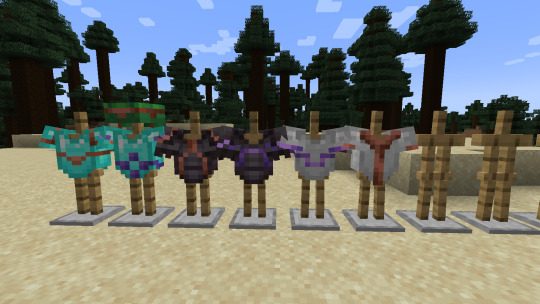
Just a quick bash at looking at the proposed armor trim feature for 1.20, available in the 1.20 experimental data pack in snapshot 23w04a. Barely scratching the surface in this screenshot; check after the break for the list of trims and materials. Works on the pants, boots, and helmets too, not just the chestplates.
I likes. Especially having more uses for copper, though that amethyst looks pretty snazzy.
Java snapshot change log. Bedrock beta with trims not available at time I made this post. Announcement.
At first I was a bit worried about the proposed change to netherite upgrade process, but you can duplicate the templates with 7 diamonds, the template itself, and a block of what the template is made out of. Appears to be a shaped recipe, but it is in the crafting book.
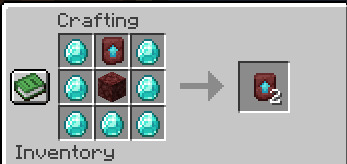
And the netherite upgrade template isn't made out of netherite -- it's made out of netherrack. Get one out of a bastion raid and make it back, and you're set. The expensive part of any template dupe is going to be the 7 diamonds.
Templates are consumed when applied, so duplicating via diamonds is something you'll likely want to do.
Possible trim materials:
Iron
Copper
Gold
Lapis
Emerald
Diamond
Netherite
Redstone
Amethyst
Quartz
Can't use the material of the armor as a trim for itself. Leather armor not getting the trim system; they've got their dye system.
Finding templates means there's more reason to explore many structures in the world. The list as of this snapshot:
Pillager Outpost - Sentry Armor Trim
Desert Pyramid - Dune Armor Trim
Shipwreck - Coast Armor Trim
Jungle Temple - Wild Armor Trim
Ocean Monument - Tide Armor Trim -- Not in a chest, chance to drop from Elder Guardian (wonder if that replaces their sponge drop? I've heard it said that was always a placeholder)
Ancient City - Ward Armor Trim
Woodland Mansion - Vex Armor Trim
Nether Fortress - Rib Armor Trim
Bastion Remnant - Snout Armor Trim
Stronghold - Eye Armor Trim
End City - Spire Armor Trim
Netherite Upgrade Smithing Templates can be found randomly in all Bastion Remnant chests, and there is a guarantee of 2 in every Treasure Room Bastion Remnant
2 notes
·
View notes
Note
Separate ask so it doesn’t get too long, can I also get falling asleep with their head in the other’s lap and reacting to the other crying about something for Rory and Carlo during the time skip, please?
Thank you (again) for the ask! These were delightful!
Wind rattles the windows of Rory's new apartment. It's somehow colder and smaller than the last one.
It's been hard to find a place that has an owner she trusts not to turn them in to the remnants of the Star for a few coins. But their new landlord was run out of his previous business for refusing to allow the Star's smugglers to funnel their money through his establishment, so she's pretty sure she's dealing with someone who has no intention of bending to their demands.
Still, it's once again extremely evident that crossing the Star comes at a high price. And for her and Carlo, it will be a lot worse than just losing a home.
Eventually, once she gets some money together, she'll try and make this a halfway decent place to live. But right now, she and Carlo are huddled against each other, under a tattered blanket, on the straw mattress on the floor. That's the best they can do for tonight.
Carlo leans against her. His head is heavy on her shoulder, and when she shifts slightly to move her arm so it doesn't go numb on her (the feeling of dead limbs is still viscerally disconcerting, even if now it's not a sign she's dying), his head drops down until he's laid out halfway across her lap. He curls into her like a pillow, breaths slow and even.
Rory runs her fingers through his tangled curls the way Old Sue used to brush back her hair.
She sighs.
Just like Old Sue, she's caring for a child who's not her own. But it's still not the same. Rory's mother selfishly abandoned her for a better life. Emmett left Carlo to protect him. Then went and turned himself in like the hopelessly earnest idiot he is and got himself sent to the Bastion, all to throw the Star's people off Carlo's track.
Rory looks down at Carlo, swallowing a strange and totally irrational feeling of tears choking her throat.
She's just looking after this kid until she can figure out a way to get his dad out of the hole he dug himself into. So Carlo doesn't grow up like her, fatherless because of Marcus's actions.
Carlo isn't hers. He never will be.
She can't afford to ever let any part of her think otherwise.
Carlo is a quiet kid.
From what Rory remembers of her childhood, she was a loud one. Getting them complaints from the neighbors banging on the thin wall between row houses, being scolded by her mother for careening around the house and leaping on their rickety furniture, and screeching enthusiastically when she found a fang mouse in her shoe (then sobbing dramatically when her mother threw the whole thing out the door and said vermin weren't pets. Rory had tried to protest, arguing that it wasn't any different than Dad keeping Blizzard the pigeon, but she hadn't won).
Carlo is like having a ghost living with her. He barely rattles a dish when he's cleaning them in the kettle, his footsteps hardly make a creak on the old boards, and he almost never says anything unless Rory asks him a question first.
Even his crying is nearly silent.
But Rory can still hear it.
She finds Carlo in the corner of their apartment, face buried in one of the sweaters he'd taken from his family's old home.
"Carlo? What's wrong?"
He looks up from the sweater, face tear-streaked and pattered with the cable-knit imprint of the material.
"It's too small," he whispers.
Rory probably should have clarified, 'grab some of your dad's clothing', before they burnt the place. She'd been more concerned about Carlo accidentally leaving behind something that could be used to track their whereabouts than future clothing needs. But she's pretty sure that practicality isn't the reason Carlo is upset.
His mother has been dead for over two years. Anything she'd made for Carlo has been long outgrown. But it's all of her he has left.
Rory kneels down beside him, running a finger over the material.
"Did your mom make this?"
He nods, sniffling.
Rory has an idea.
"If it can't be a sweater anymore, maybe we can make it a bag."
Her sewing skills are abysmal, but she's seen more than one person at the market with bags made from knitted yarn that seems to have been shrunk firm and then had a strap sewn on. It doesn't seem like it should be impossible to remove the arms and neck, and sew it closed.
She's definitely not going to try that on Carlo's sweater first, though.
Carlo blinks.
"A bag?"
"Like mine?" Rory says, patting the leather at her hip. "We can match."
A tiny, faint smile, as subdued as the rest of him, creeps across Carlo's face.
From this ask game
1 note
·
View note
Text
Whys the nether in minecraft so scary now…it used to be just ghasts you had to worry about (unless you went to a fortress) and now I have to wear gold, arm myself with blue mushrooms and be attacked every time I open a chest. I thought I finally found a nether fortress but it was a bastion remnant ??
0 notes